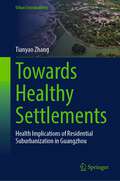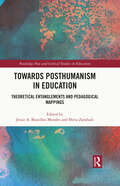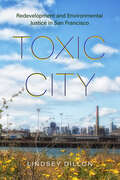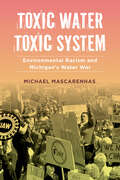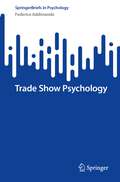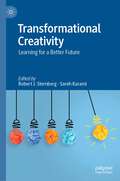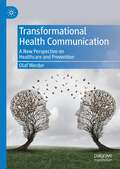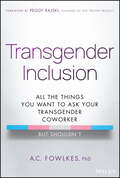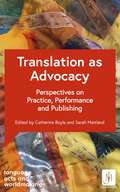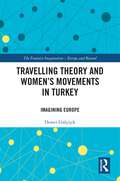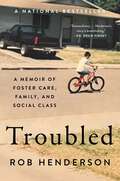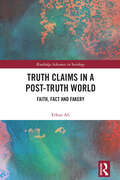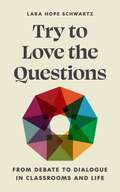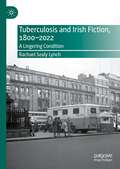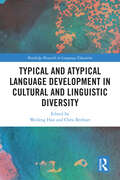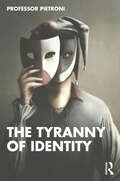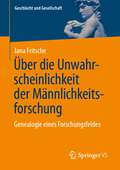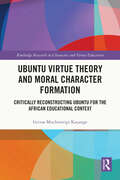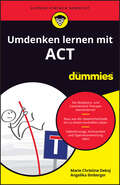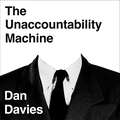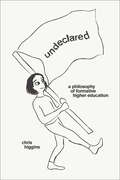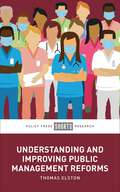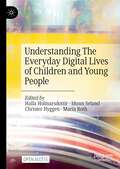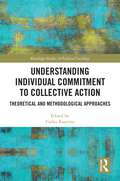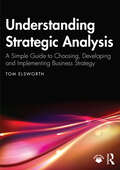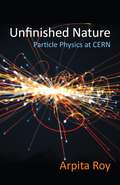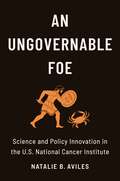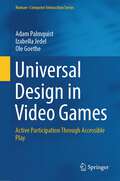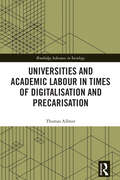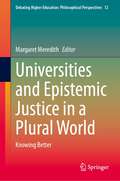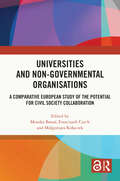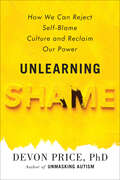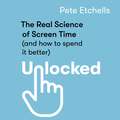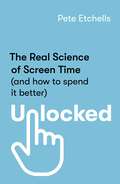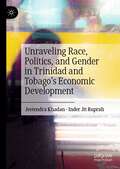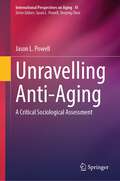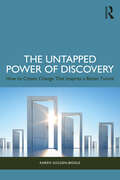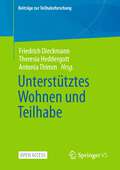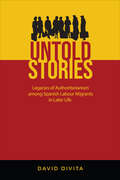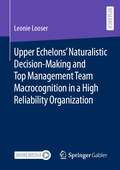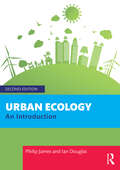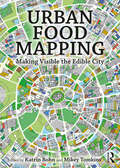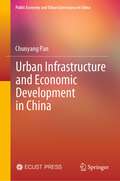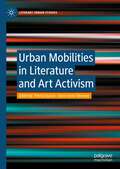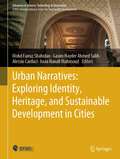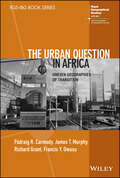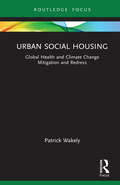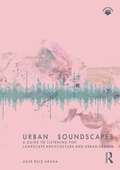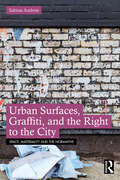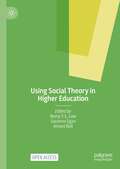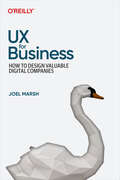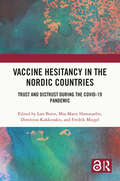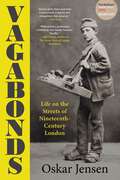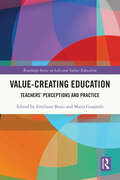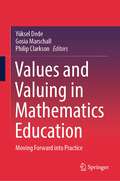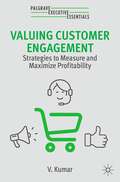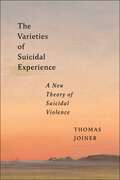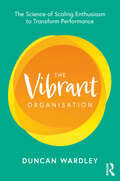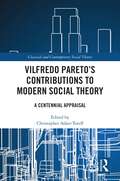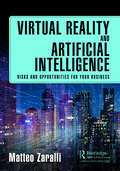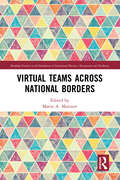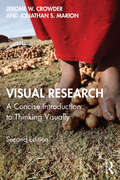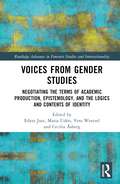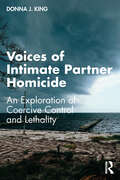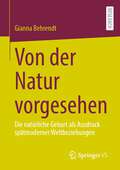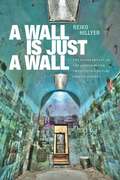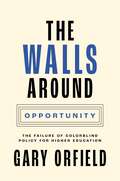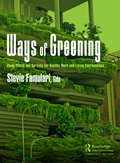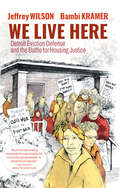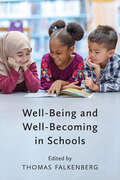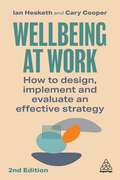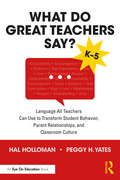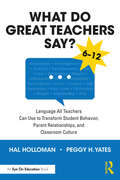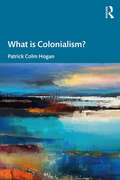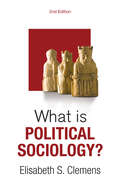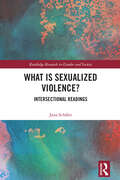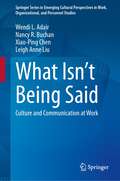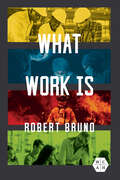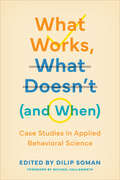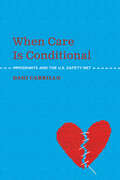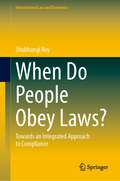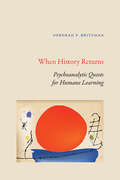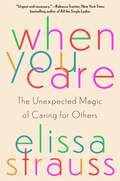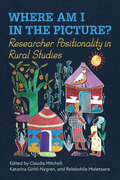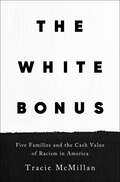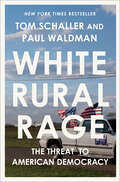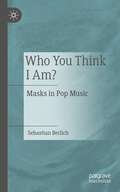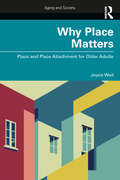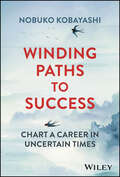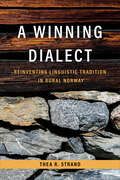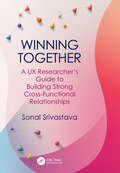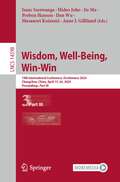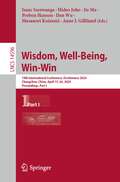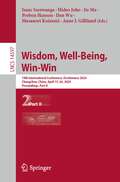- Table View
- List View
Towards Healthy Settlements: Health Implications of Residential Suburbanization in Guangzhou (Urban Sustainability)
by Tianyao ZhangThis book aims to formulate recommendations for achieving a healthy neighborhood living environment for the middle-income people in China‘s suburbs. In China, the expeditious urbanization triggers the prosperous commodity housing development, which further grows with the spatial restructuring and socioeconomic transition. Residential suburbanization is generated, accompanied with the emergence of new-middle class and the change of lifestyle. However, the health effects of suburbanization in China are overlooked. This book investigates the health performance of suburban residents and the effects of suburban living on residents‘ health. This book also examines the resident-environment transaction modes to unfold the underlying mechanism of suburban living affecting residents’ health. Suburban residents had to passively adapt to their residential environment, which is the obstacle for achieving a health-promoting environment. The institutional dynamics determining the health performance of suburban living environment were addressed with the roles of governments, developers, planners, housing managers, residents‘ committee, and ordinary residents in commodity housing development. The book found no institutional support for the creation of health-promoting environments, especially with default of governments and excessive dependence on developers for public service facilities and the absence of civil society. Thus, the book proposes that institutional innovations are necessary in term of embedding the health dimension in all sectors of the society, enlisting collaboration between public and private sectors, and between health and non-health sectors, and thus cultivating the optimization of residents-environment transactions to create health-promoting environments.
Towards Posthumanism in Education: Theoretical Entanglements and Pedagogical Mappings (Routledge New and Critical Studies in Education)
by Jessie A. Bustillos Morales Shiva ZarabadiThis edited volume presents a post-humanist reflection on education, mapping the complex transdisciplinary pedagogy and theoretical research while also addressing questions related to marginalised voices, colonial discourses, and the relationship between theory and practice.Exhibiting a re-imagination of education through themed relationalities that can transverse education, this cutting-edge book highlights the importance of matter in educational environments, enriching pedagogies, teacher-student relationships and curricular innovation. Chapters present contributions that explore education through various international contexts and educational sectors, unravelling educational implications with reference to the climate change crisis, migrant children in education, post-pandemic education, feminist activists and other emergent issues. The book examines the ongoing iterations of the entanglement of colonisation, modernity, and humanity with education to propose a possibility of education capable of upholding heterogeneous worlds.Curated with a global perspective on transversal relationalities and offering a unique outlook on posthuman thoughts and actions related to education, this book will be an important reading for students, researchers and academics in the fields of philosophy of education, sociology of education, posthumanism and new materialism, curriculum studies, and educational research.
Toxic City: Redevelopment and Environmental Justice in San Francisco
by Lindsey DillonToxic City presents a novel critique of postindustrial green gentrification through a study of Bayview-Hunters Point, a historically Black neighborhood in San Francisco. As cities across the United States clean up and transform contaminated waterfronts and abandoned factories into inviting spaces of urban nature and green living, working-class residents—who previously lived with the effects of state abandonment, corporate divestment, and industrial pollution—are threatened with displacement at the very moment these neighborhoods are cleaned, greened, and revitalized. Lindsey Dillon details how residents of Bayview-Hunters Point have fought for years for toxic cleanup and urban redevelopment to be a reparative process and how their efforts are linked to long-standing struggles for Black community control and self-determination. She argues that environmental racism is part of a long history of harm linked to slavery and its afterlives and concludes that environmental justice can be conceived within a larger project of reparations.
Toxic Water, Toxic System: Environmental Racism and Michigan's Water War
by Prof. Michael MascarenhasThe tireless resistance of local communities fighting for ownership of America’s third largest water system Toxic Water, Toxic System exposes the consequences of a seemingly anonymous authoritarian state willing to maintain white supremacy at any cost—including poisoning an entire city and shutting off water to thousands of people. Weaving together narratives of frontline activists along with archival data, Michael Mascarenhas provides a powerful exploration of the political alliances and bureaucratic mechanisms that uphold inequality. Drawing from three years of ethnographic fieldwork in Flint and Detroit, this book amplifies the voices of marginalized communities, particularly African American women, whose perspectives and labor have been consistently overlooked. Toxic Water, Toxic System offers a fresh perspective on the ties between urban austerity policies, environmental harm, and the advancement of white supremacist agendas in predominantly Black and brown cities.
Trade Show Psychology (SpringerBriefs in Psychology)
by Federico AddimandoIn this book, readers are taken on an illuminating journey into the world of trade shows from a unique perspective – the psychology of both exhibitors and attendees. This comprehensive guide delves deep into the intricacies of drawing visitors to your booth and forging meaningful connections. It offers a wealth of insights into the art of engaging potential clients effectively and understanding their behavior within the bustling trade show environment. The book covers a wide array of topics, including techniques for attracting visitors to your booth, effective communication strategies, and the psychology behind booth design. From the selection of color schemes and themes that resonate with your target audience to crafting compelling messages that leave a lasting impression, this book provides practical advice for achieving trade show success. It also explores the role of technology and digital marketing in modern trade show strategies, offering a blend of timeless principles and cutting-edge approaches. Moreover, the text delves into case studies and real-world examples from successful exhibitors, showcasing their innovative methods and success stories. Whether you're a seasoned trade show veteran or a newcomer looking to make a splash, this book equips you with the knowledge and strategies needed to thrive in the competitive world of trade shows. With its engaging and informative content, 'Trade Show Psychology' is an indispensable resource for anyone seeking to maximize their impact and ROI at trade shows.
Transformational Creativity: Learning for a Better Future
by Robert J. Sternberg Sareh KaramiThis edited volume brings together leading scholars in diverse disciplines to share their best thinking on how creativity can be conceived of, taught for, and deployed to serve rather than undermine humanity. Transformational creativity, as defined in this book, is creativity deployed to make a positive, meaningful, and potentially enduring difference to the world. Transformational creativity is compared to transactional creativity, which is creativity deployed in search of a reward, whether externally or internally generated.
Transformational Health Communication: A New Perspective on Healthcare and Prevention
by Olaf WerderThis book advances our understanding of communicative relationships and key barriers to more effective health communication. In this, it offers a humanistic orientation of health communication as well as its social, cultural, political, ethical, and spiritual dimensions and contexts. The book therefore brings a more inclusive and integrated approach to the major challenges and opportunities in contemporary health, medicine, and wellbeing.
Transgender Inclusion: All the Things You Want to Ask Your Transgender Coworker but Shouldn't
by A. C. FowlkesDiscover the realities for transgender people in the workplace and beyond as they move through any of the three recognized kinds of transition—and how to be an ally. In Transgender Inclusion: All The Things You Want To Ask Your Transgender Coworker But Shouldn’t, clinical psychologist and trans inclusion specialist Dr. A.C. Fowlkes delivers an essential and remarkably honest discussion of the realities of the workplace for transgender people. In the book, you’ll explore the experiences that trans people have in the workplace as they move through none, one, or more of the three recognized kinds of transition—medical, social, and legal. You’ll learn answers to your questions about your transgender colleagues, so you can be respectful of your coworker’s feelings and work together comfortably. You’ll also find: Discussions of how and why transgender people often feel excluded from the workplace and by their colleagues Explorations of the unfortunately common reality of harassment and maltreatment of transgender workers How and why information about transgender experiences in the workplace is helpful to everyone Approximately 1.3 million adults in the United States identify as transgender. If you don’t already have a transgender friend, neighbor, or co-worker, you might very well have one in the future. A practical, compassionate, and evidence-based discussion of the transgender experience, Transgender Inclusion is a must-read guide for managers, executives, professionals, and allies who want to learn more and do more about trans issues in the workplace.
Translation as Advocacy: Perspectives on Practice, Performance and Publishing (Language Acts and Worldmaking)
by VariousWhat does it mean to advocate - in translation, for translation, through translation? What does advocacy look like, for those who do the translating or for those whose work is translated? To what extent is translation itself a form of advocacy? These 'what' questions are the driving force behind this collection.Translation as Advocacy highlights the innovative ways in which translator-academics in seven different fields discuss their practice in relation to their understanding of advocacy. The book aims to encourage people to think about translators as active agents bringing new work into the receiving culture, advocating for the writers they translate, for ideas, for practices. As such, the book asserts that the act of translation is a mode of cultural production and a political intervention through which the translator, as advocate, claims a significant position in intercultural dialogue.Featuring seven interrelated chapters, the book covers themes of judgement, spaces for translation, classroom practice, collaboration, intercultural position, textuality, and voice. Each chapter explores the specific demands of different types of translation work, the specific role of each stage of the process and what advocacy means at each of these stages, for example: choosing what is translated; mediating between author and receiving culture; pitching to publishers; social interactions; framing the translation for different audiences; teaching; creating new canons; gatekeepers and prizes; dissemination; marketing and reception. This book repositions the role of the translator-academic as an activist who uses their knowledge and understanding to bring agency to the complex processes of understanding across time and space. Moving critically through the different stages that the translator-academic occupies, using the spaces for research, performance and classroom teaching as springboards for active engagement with the key preoccupations of our times, this book will highlight translation as advocacy for students, educators, audiences for translation and the translation industry.Like all the volumes in the Language Acts and Worldmaking series, the overall aim is two-fold: to challenge widely-held views about language learning as a neutral instrument of globalisation and to innovate and transform language research, teaching and learning, together with Modern Languages as an academic discipline, by foregrounding its unique form of cognition and critical engagement.Specific aims are to:· propose new ways of bridging the gaps between those who teach and research languages and those who learn and use them in everyday contexts from the professional to the personal· put research into the hands of wider audiences· share a philosophy, policy and practice of language teaching and learning which turns research into action· provide the research, experience and data to enable informed debates on current issues and attitudes in language learning, teaching and research· share knowledge across and within all levels and experiences of language learning and teaching· showcase exciting new work that derives from different types of community activity and is of practical relevance to its audiences· disseminate new research in languages that engages with diverse communities of language practitioners.
Translation as Advocacy: Perspectives on Practice, Performance and Publishing (Language Acts and Worldmaking)
by VariousWhat does it mean to advocate - in translation, for translation, through translation? What does advocacy look like, for those who do the translating or for those whose work is translated? To what extent is translation itself a form of advocacy? These 'what' questions are the driving force behind this collection.Translation as Advocacy highlights the innovative ways in which translator-academics in seven different fields discuss their practice in relation to their understanding of advocacy. The book aims to encourage people to think about translators as active agents bringing new work into the receiving culture, advocating for the writers they translate, for ideas, for practices. As such, the book asserts that the act of translation is a mode of cultural production and a political intervention through which the translator, as advocate, claims a significant position in intercultural dialogue.Featuring seven interrelated chapters, the book covers themes of judgement, spaces for translation, classroom practice, collaboration, intercultural position, textuality, and voice. Each chapter explores the specific demands of different types of translation work, the specific role of each stage of the process and what advocacy means at each of these stages, for example: choosing what is translated; mediating between author and receiving culture; pitching to publishers; social interactions; framing the translation for different audiences; teaching; creating new canons; gatekeepers and prizes; dissemination; marketing and reception. This book repositions the role of the translator-academic as an activist who uses their knowledge and understanding to bring agency to the complex processes of understanding across time and space. Moving critically through the different stages that the translator-academic occupies, using the spaces for research, performance and classroom teaching as springboards for active engagement with the key preoccupations of our times, this book will highlight translation as advocacy for students, educators, audiences for translation and the translation industry.Like all the volumes in the Language Acts and Worldmaking series, the overall aim is two-fold: to challenge widely-held views about language learning as a neutral instrument of globalisation and to innovate and transform language research, teaching and learning, together with Modern Languages as an academic discipline, by foregrounding its unique form of cognition and critical engagement.Specific aims are to:· propose new ways of bridging the gaps between those who teach and research languages and those who learn and use them in everyday contexts from the professional to the personal· put research into the hands of wider audiences· share a philosophy, policy and practice of language teaching and learning which turns research into action· provide the research, experience and data to enable informed debates on current issues and attitudes in language learning, teaching and research· share knowledge across and within all levels and experiences of language learning and teaching· showcase exciting new work that derives from different types of community activity and is of practical relevance to its audiences· disseminate new research in languages that engages with diverse communities of language practitioners.
Travelling Theory and Women’s Movements in Turkey: Imagining Europe (The Feminist Imagination - Europe and Beyond)
by Demet GulcicekDrawing on archival research, Travelling Theory and Women’s Movements in Turkey examines the imagination of Europe in the context of women’s rights movements in a self-defined non-European setting. It brings travelling theory, poststructuralist feminist theories and orientalist studies together to provide an original theoretical framework for understanding the complex and often contradictory imaginations of Europe. Such imaginations can be an object of desire, fantasy, hate and hostility in a non-European context. This volume sheds light on the manner in which local power dynamics are reproduced, negotiated and subverted during the travel of women’s and feminist movements. With a focus on the late Ottoman Empire, the book questions how ‘Other’ positions can be inhabited by the ‘Self’ and unpacks sexual and normative dimensions of demanding women’s rights in this context. As such, it will appeal to scholars of sociology, cultural studies and gender studies with interests in feminist theory and notions of European and non-European categories.
Troubled: A Memoir of Foster Care, Family, and Social Class
by Rob HendersonIn this raw coming-of-age memoir, in the vein of The Short and Tragic Life of Robert Peace, The Other Wes Moore, and Someone Has Led This Child to Believe, Rob Henderson vividly recounts growing up in foster care, enlisting in the US Air Force, attending elite universities, and pioneering the concept of &“luxury beliefs&”—ideas and opinions that confer status on the upper class while inflicting costs on the less fortunate.Rob Henderson was born to a drug-addicted mother and a father he never met, ultimately shuttling between ten different foster homes in California. When he was adopted into a loving family, he hoped that life would finally be stable and safe. Divorce, tragedy, poverty, and violence marked his adolescent and teen years, propelling Henderson to join the military upon completing high school. An unflinching portrait of shattered families, desperation, and determination, Troubled recounts Henderson&’s expectation-defying young life and juxtaposes his story with those of his friends who wound up incarcerated or killed. He retreads the steps and missteps he took to escape the drama and disorder of his youth. As he navigates the peaks and valleys of social class, Henderson finds that he remains on the outside looking in. His greatest achievements—a military career, an undergraduate education from Yale, a PhD from Cambridge—feel like hollow measures of success. He argues that stability at home is more important than external accomplishments, and he illustrates the ways the most privileged among us benefit from a set of social standards that actively harm the most vulnerable.
Truth Claims in a Post-Truth World: Faith, Fact and Fakery (Routledge Advances in Sociology)
by Erkan AliDrawing on debates from a multi-disciplinary perspective, this book examines what it means to offer a genuine sociological critique of religious faith, illiberalism and anti-secularism from a macro perspective. Arguing that as a discipline concerned with real issues in the social world, sociology should be at the forefront of any analysis of religious power and legitimacy, the author contends that much religious faith is fundamentally incompatible with any twenty-first-century society that seeks inclusive, utilitarian and humanistic principles as its goals. With an emphasis on sociology, the effects of organised religion’s overall decline in modern Western contexts are explored, while the troubling re-emergence or persistence of faith-based and other non-evidentiary perspectives is also discussed via debates around identity politics, postmodernism and multiculturalism. Through an analysis of the rise of irrational thinking in our politics and our entire social and cultural fabric, the book moves to conclude that religious beliefs and other forms of dogmatism are underpinned by powerful, influential and potentially dangerous ideological structures at various levels of society and that viable, secular alternatives to faith teachings ought to be nurtured in their place. A critique of religion that advances modern, secular humanistic thought, Truth Claims in a Post-Truth World will appeal to scholars of sociology, social theory and philosophy with interests in religion, political thought, ethics and civil society.
Try to Love the Questions: From Debate to Dialogue in Classrooms and Life (Skills for Scholars)
by Lara SchwartzAn essential guide to dialogue in the college classroom and beyondTry to Love the Questions gives college students a framework for understanding and practicing dialogue across difference in and out of the classroom. This invaluable guide explores the challenges facing students as they prepare to listen, speak, and learn in a college community and encourages students and faculty alike to consider inclusive, respectful communication as a skill—not as a limitation on freedom.Among the most common challenges on college campuses today is figuring out how to navigate our politically charged culture and engage productively with opposing viewpoints. Lara Schwartz introduces the fundamental principles of free expression, academic freedom, and academic dialogue, showing how open expression is the engine of social progress, scholarship, and inclusion. She sheds light on the rules and norms that govern campus discourse—such as the First Amendment, campus expression policies, and academic standards—and encourages students to adopt a mindset of inquiry that embraces uncertainty and a love of questions.Empowering students, scholars, and instructors to listen generously, explore questions with integrity, and communicate to be understood, Try to Love the Questions includes writing exercises and discussion questions in every chapter, making it an indispensable resource for anyone interested in practicing good-faith dialogue.
Tuberculosis and Irish Fiction, 1800–2022: A Lingering Condition (New Directions in Irish and Irish American Literature)
by Rachael Sealy LynchThis book focuses on Ireland’s lived experience of tuberculosis as represented in the nation’s fiction; not surprisingly, the disease both manifests and conceals itself with devastating frequency in literature as it did in life. It seeks to place the history of tuberculosis in Ireland, from 1800 until after its virtual eradication in the mid-Twentieth Century, in conversation with fictional representations or repressions of a condition so fearsome that until very recently it was usually referred to by code words and euphemisms rather than by its name.
Typical and Atypical Language Development in Cultural and Linguistic Diversity (Routledge Research in Language Education)
by Weifeng Han and Chris BrebnerTypical and Atypical Language Development in Cultural and Linguistic Diversity brings together state-of-the-art studies in both typical and atypical language development. Placing the topic in the context of cultural and linguistic diversity (CALD), the book offers readers serious theoretical consideration of the topic and provides implications for multilingual educational and clinical practices. The content covers a wide range of topics related to multilingual language development in CALD: typical and atypical language development in CALD, and the interface between both; the relationship between multilingual competence and academic performance in CALD; providing unbiased speech and language measures in CALD; and heritage and minority languages education in CALD. Each chapter outlines the core theoretical and practical issues and explores both theoretical and pedagogical/clinical implications in the area and possible future developments. This volume is an essential resource for all those who study, research, or are interested in multilingual development, educational linguistics, and clinical linguistics in the CALD context.
The Tyranny of Identity
by Patrick PietroniThe Tyranny of Identity is both a personal and highly interdisciplinary examination of the wide range of factors and disciplines at play in the formation of identity. It takes a novel and unique approach to this through use of metaphor, images, poetry and a wide range of academic sources to provide a holistic approach to the study of identity. This book uses the concept of Babushka dolls to show that we all have a series of activities during our lives that reside in our mind, body, spirit – each influencing the multiple identities we knowingly or unknowingly possess. This collage of factors and forces allows us to create an identity. The layers of identity unfold as the chapters progress and in doing so the book addresses the manifold ways in which identity intersects with nationhood, politics, education, the culture wars, family, religion, gender and contemporary institutions. The Tyranny of Identity is a wide-ranging, cross-cultural book that integrates and explores how the issue of identity has become a central issue in every academic discipline. This book is essential reading to all students studying identity and all readers seeking a deeper understanding of this complex topic.
Über die Unwahrscheinlichkeit der Männlichkeitsforschung: Genealogie eines Forschungsfeldes (Geschlecht und Gesellschaft #80)
by Jana Fritsche‚Männlichkeit‘ gilt als lange gleichgesetzt mit dem ‚Allgemein-Menschlichen‘ und daher als Spezifikum regelrecht unsichtbar. Was macht das Nachdenken über und die Beforschung von ‚Männlichkeit‘ dann epistemologisch wie gesellschaftlich wahrscheinlich? Dieser Frage geht die vorliegende Studie aus gesellschaftstheoretischer Perspektive nach. Entlang sozialwissenschaftlicher Publikationen zu ‚Männlichkeit‘ von 1908-2022 werden gesellschaftliche Zusammenhänge rekonstruiert, die die (wissenschaftliche) Reflexivierung von ‚Männlichkeit‘ bedingen. Damit stellt die Studie eine erste systematische Untersuchung des Feldes der Männlichkeitsforschung dar. Zudem entpuppt sich das vergleichsweise kleine Forschungsfeld als reichhaltiges Labor, an dem sich über dessen Partikularität hinaus soziologische Grundfragen und methodologische Aspekte diskutieren lassen: darunter Subjekt-Gesellschaft-Verhältnisse, Epistemologie und Operationalisierung, Prozesse der Grenzziehungen und Stabilisierung wissenschaftlicher Disziplinen sowie die Bedeutung von Un-/Sichtbarkeit, Paradoxien und blinden Flecken von Beobachtungen.
Ubuntu Virtue Theory and Moral Character Formation: Critically Reconstructing Ubuntu for the African Educational Context (Routledge Research in Character and Virtue Education)
by Grivas Muchineripi KayangeThis book investigates the ubuntu theory-based conception of virtue and moral character formation in the northern, western, and eastern regions of Africa, suggesting a critical reconstruction of ubuntu by conceptualising the four different forms of practices in moral character formation. Arguing for the critical reconstruction of ubuntu virtue theory as more nuanced than simply the standard ubuntu normative virtue theories (which give priority to the community as the sole locus for understanding virtues and character formation in Africa), the book builds a comprehensive model of virtue and moral character formation that draws insights from the reconstructed notion of ubuntu and other theories within and beyond the African thought. Chapters feature experience from across Africa including Malawi, Zambia, Zimbabwe, Uganda, Kenya, and South Africa, and centre on topics such as traditional cultural views and practices, political systems in various nations, neoliberalist thought, and primary, secondary and tertiary education systems in Africa and further afield. This is a valuable resource for scholars, academics, and postgraduate students, working in the fields of moral and values education, philosophy of education, and the theory of education more broadly. Those also interested in educational psychology may also find the volume of interest.
Umdenken lernen mit ACT für Dummies (Für Dummies)
by Marie Christine Dekoj Angelika IlmbergerRaus aus der Gewohnheitsfalle hin zu einem sinnhaften Leben Möchten Sie Ihrem Leben mehr Sinn geben und Ihren Werten entsprechend leben? Die Akzeptanz- und Commitment-Therapie kann Ihnen dabei helfen. Üben Sie sich in Akzeptanz, also Dinge und Gefühle anzunehmen, wie sie sind. Lernen Sie, der Gewohnheitsfalle zu entfliehen und anders mit Ihren Gedanken und Gefühlen umzugehen. Üben Sie sich in Achtsamkeit und dem Leben im Hier und Jetzt. Sorgen Sie durch Selbstmitgefühl und Selbstfürsorge dafür, dass es Ihnen gut geht. Und finden Sie heraus, welche Werte Ihnen im Leben wirklich wichtig sind und wie Sie sie mit engagiertem Handeln verfolgen können. Sie erfahren Wie Sie eine andere Perspektive auf sich selbst entwickeln Wie Sie Gewohnheiten ändern, die Ihnen nicht guttun Wie Sie mit dem ständigen Gedankenkarussel und Gefühlschaos umgehen
The Unaccountability Machine: Why Big Systems Make Terrible Decisions - and How The World Lost its Mind
by Dan Davies'A corporation, or a government department isn't a conscious being, but it is an artificial intelligence. It has the capability to take decisions which are completely distinct from the intentions of any of the people who compose it. And under stressful conditions, it can go stark raving mad.'When we avoid taking a decision, what happens to it? In The Unaccountability Machine, Dan Davies examines why markets, institutions and even governments systematically generate outcomes that everyone involved claims not to want. He casts new light on the writing of Stafford Beer, a legendary economist who argued in the 1950s that we should regard organisations as artificial intelligences, capable of taking decisions that are distinct from the intentions of their members. Management cybernetics was Beer's science of applying self-regulation in organisational settings, but it was largely ignored - with the result being the political and economic crises that that we see today. With his signature blend of cynicism and journalistic rigour, Davies looks at what's gone wrong, and what might have been, hadthe world listened to Stafford Beer when it had the chance.
Undeclared: A Philosophy of Formative Higher Education
by Chris HigginsAn imaginative tour of the contemporary university as it could be: a place to discover self-knowledge, meaning, and purpose.What if college were not just a means of acquiring credentials, but a place to pursue our formation as whole persons striving to lead lives of meaning and purpose? In Undeclared, Chris Higgins confronts the contemporary university in a bid to reclaim a formative mission for higher education. In a series of searching essays and pointed interludes, Higgins challenges us to acknowledge how far our practices have drifted from our ideals, asking: What would it look like to build a college from the ground up to support self-discovery and personal integration? What does it mean to be a public university, and are there any left? How can the humanities help the job-ified university begin to take vocation seriously?Cutting through the underbrush of received ideas, Higgins follows the insight where it leads, clearing a path from the corporate multiversity to the renaissance in higher education that was Black Mountain College and back again. Along the way, we tour a campus bent on becoming a shopping mall, accompany John Dewey through a midlife crisis, and witness the first "happening.&” Through diverse and grounded philosophical engagements, Undeclared assembles the resources to expand the contemporary educational imagination.
Understanding and Improving Public Management Reforms
by Thomas ElstonWhy do top-down reforms to public services so often over-promise and under-deliver? Using five concepts from psychology, economics and organisational sociology, Thomas Elston addresses this pressing question of good governance. Rather than focusing on the challenge of implementation, Understanding and Improving Public Management Reforms reveals how flawed policy design is often the major contributor to reform failure. Cognitive bias, restrictive social institutions and inattention to ‘quiet costs’ during the policy-making process are essential to explaining the poor track record of reforms to date – and point the way towards better decision-making in future. Written for policy professionals, service managers, students and researchers alike, this concise, practical and multidisciplinary study draws on varied examples to help reconceive the perennial problem of public management reform – and to propose new solutions.
Understanding The Everyday Digital Lives of Children and Young People
by Halla Holmarsdottir Idunn Seland Christer Hyggen Maria RothThis Open Access book presents an in-depth portrait of the use and impact of digital technologies by learners ages 5-18 years in their everyday lives. The portrait is framed by the ecological-systems theory and situated across four domains: home, leisure time, education, and civic participation. Various methodological approaches are used in innovative ways to analyze data collected in a large-scale EU Horizon 2020 project. The purpose of this edited collection is to shed light on both beneficial and harmful effects of digital technology from a perspective that children are active agents who are empowered to accentuate the positives of digital technology use and over common challenges that inhibit digital competence with support from education stakeholders.This is an open access book.
Understanding Individual Commitment to Collective Action: Theoretical and Methodological Approaches (Routledge Studies in Political Sociology)
by Carlos RamírezWhen speaking colloquially of political participation or civic action, one thinks, in the first instance, of groups and organizations such as political parties, social movements or various types of voluntary associations. The perspective of individuals is not the first thing that comes to mind when seeking to understand their functioning. In contrast to this vision, understanding the dynamics of participation requires taking a closer look at the individual, that is, at his or her moral dispositions and projects, his or her multiple and simultaneous identities, the breaking points in his or her biographical trajectory, the roles he or she adopts in an organization or the styles of communication which he or she uses. The book comprises a variety of case studies and theoretical and methodological contributions that, independent of rational choice theories, seek to understand collective action at the level of the individual and, in doing so, to articulate the various fields of study in this regard with the singularity of biographies and the reflective personal identities that characterize contemporary individualism.
Understanding Information History: The Case of America in 1920 (SpringerBriefs in History of Computing)
by William AsprayMicrohistory is a technique that has been used effectively by writers of both fiction and nonfiction. It enables the author to cut through the complexities of large swaths of history by focusing on a particular time and place. Microhistories are particularly useful in historical study when a subfield has recently arisen and there are not yet enough monographic studies from which to draw general patterns. This microhistory focuses on a single year (1920) across the United States, with the goal of understanding the various roles of information in this society. It gives greater emphasis to the informational aspects of traditional historical topics such as farming, government bureaucracy, the Spanish flu pandemic, and Prohibition; and it gives greater attention to information-rich topics such as libraries and museums, schools and colleges, the financial services and office machinery industries, scientific research institutions, and management consultancies.
Understanding Strategic Analysis: A Simple Guide to Choosing, Developing and Implementing Business Strategy
by Tom ElsworthUnderstanding Strategic Analysis is a concise and practical guide for organisational strategic analysis, strategy development, decision-making, and implementation. The book takes the reader step by step through the background of strategic management and the process of developing a new strategy. It considers how to assess the strategic capabilities and context of the organisation, how to identify and choose between the various strategic options, and how to successfully implement the change in strategy. Mini-case studies and reflective questions provide stimuli for class discussion, whilst chapter objectives and summaries structure and reinforce learning. The final chapter sets out a complete worked example to illustrate the process as a whole. Refreshing and concise, this text provides valuable and practical reading for postgraduate, MBA and executive education students of strategic management, as well as practising managers in organisations of all sizes. Online resources include a short Instructor’s Manual, chapter-by-chapter PowerPoint slides, and a test bank of exam questions.
Unfinished Nature: Particle Physics at CERN
by Arpita RoyThe discovery of the Higgs boson in 2012, the culmination of a decades-long search, is one of the singular triumphs of particle physics. Advanced experiments at the Large Hadron Collider at CERN (the Conseil Européen pour la Recherche Nucléaire) near Geneva detected the long-hypothesized particle, resulting in the 2013 Nobel Prize in Physics. Drawing on two and a half years of in-depth fieldwork spent among CERN’s research community during this critical period, Arpita Roy offers a rich analysis of science in the making.To what extent are scientific discoveries a matter of empirical findings? How do scientists at the farthest reach of abstraction understand their work? Unfinished Nature delves deep into this particle physics laboratory to distinguish the modes of reasoning that animate scientific discoveries and innovations. Demonstrating a deep knowledge of both contemporary physics and the methods of qualitative social science, Roy considers what scientists have to say about their commitments and concerns, the sources and vision guiding their experiments, and the questions they ask of themselves and others. In so doing, she argues that finding new facts in experimental physics turns on conceptual leaps, not necessarily empirical results. A sophisticated interdisciplinary ethnography of a scientific community, Unfinished Nature offers provocative insights into the nature and production of scientific knowledge.
An Ungovernable Foe: Science and Policy Innovation in the U.S. National Cancer Institute
by Natalie B. AvilesIn American politics, medical innovation is often considered the domain of the private sector. Yet some of the most significant scientific and health breakthroughs of the past century have emerged from government research institutes. The U.S. National Cancer Institute (NCI) is tasked with both understanding and eradicating cancer—and its researchers have developed a surprising expertise in virus research and vaccine development.An Ungovernable Foe examines seventy years of federally funded scientific breakthroughs in the laboratories of the NCI to shed new light on how bureaucratic organizations nurture innovation. Natalie B. Aviles analyzes research and policy efforts around the search for a viral cause of leukemia in the 1960s, the discovery of HIV and the development of AIDS drugs in the 1980s, and the invention of the HPV vaccine in the 1990s. She argues that the NCI transformed generations of researchers into innovative public servants who have learned to balance their scientific and bureaucratic missions. These “scientist-bureaucrats” are simultaneously committed to conducting cutting-edge research and stewarding the nation’s investment in cancer research, and as a result they have developed an unparalleled expertise. Aviles demonstrates how the interplay of science, politics, and administration shaped the NCI into a mission-oriented agency that enabled significant breakthroughs in cancer research—and in the process, she shows how organizational cultures indelibly stamp scientific work.
Universal Design in Video Games: Active Participation Through Accessible Play (Human–Computer Interaction Series)
by Adam Palmquist Izabella Jedel Ole GoetheAs participation in game related activities increases around the world and across a larger part of the population, it is obvious that games are not just an entertainment medium for children or young people. Games can be used to accomplish different purposes for different groups of people in society. Developing a universal designed game involves more than adding a cast of diverse characters. Games with universal design, at their core, are experiences that are designed from the ground up to be accessible to everyone – through mechanics, options, and user experience. This book explains the meaning and need for universal design in video games and sheds light on important disciplines. Researchers define a universal designed game as a video game that actively welcomes all players. When players connect authentically with a video game, they’re much more likely to engage with the content. Conversely, when players can’t physically play a game, or don’t see characters that look like them, they feel isolated and miss out on beneficial opportunities to learn and collaborate. Universal design maximizes the impact of playing games, for instance, by ensuring that they’re accessible, empowering and representative for every participant.
Universities and Academic Labour in Times of Digitalisation and Precarisation (Routledge Advances in Sociology)
by Thomas AllmerThis book provides a critical perspective on the digitalisation of universities and precarisation of academic labour. While research and teaching become more virtual and digital at universities, academic labour is becoming more and more casualised and temporary. This book aims to analyse and theorise academic labour and study the experiences academic workers have made at universities that are shaped by economic, political and cultural contexts. It will be a valuable tool for international scholars and students of subjects such as media, communication and cultural studies, sociology, education, management and labour studies. The insights will also be of particular relevance for unions and other initiatives that are concerned about the working conditions at universities.
Universities and Epistemic Justice in a Plural World: Knowing Better (Debating Higher Education: Philosophical Perspectives #12)
by Margaret MeredithThis book explains why universities, and academics within them, must engage with the diversity of knowledges and knowers that exist in the world. Through philosophical perspectives, theoretical frameworks and practical examples from around the world, the book searches for opportunities for renewal and inclusion in universities. It explains how higher education can better serve the purposes of social justice by re-evaluating the types of knowledge it promotes. Going beyond the identification and analysis of injustices in ways of knowing in academia, the book offers insights and examples of practices in teaching, research and work with the community which aim to move towards justice on an epistemic level. It argues that inclusion in the domain of knowledge can lead to the generation of knowledges and understandings that are more robust and better equipped to address the pressing needs of the plural worlds outside the university. Contributions are included from authors working in varied disciplinary and cultural contexts in universities, who describe and explicate their work towards identifying epistemic injustice and finding spaces to advance knowledge justice in theory and in practice. The book will be beneficial to academics and those with an interest in the role of universities in serving the public good.
Universities and Non-Governmental Organisations: A Comparative European Study of the Potential for Civil Society Collaboration
by Monika Banaś Franciszek Czech Małgorzata KołaczekIn the opinion of the general public, universities and NGOs would be natural partners for effective collaboration in many fields. They are indeed, but mainly in theory. This book examines the reasons why this is the case and what possible models of cooperation and facilitated dialogue between institutions of higher education system and NGOs could transform this theoretically optimal union into practice. The authors start with Poland and analyse legal, cultural and socio-economic factors, which impact upon the current state of affairs. Subsequently they move on to consider cases from four other European countries: Portugal, Austria, Slovakia and the United Kingdom. Then they propose possible solutions, areas for further research and formulate recommendations for strengthening future cooperation between the two main types of actors which shape education and increase awareness in civil societies. Universities and Non-Governmental Organisations will appeal to scholars across the social sciences with interests in higher education and research, public discourse and civil society.
Unlearning Shame: How We Can Reject Self-Blame Culture and Reclaim Our Power
by Devon PriceLearn to identify—and combat—Systemic Shame, the feeling of self-hatred and disempowerment that comes from living in a society that blames individuals for systemic problems, with this invaluable resource from the social psychologist and author of Unmasking Autism.&“Stop doomscrolling and read this book. You&’ll feel better, I promise.&”—Celeste Headlee, journalist and bestselling authorSystemic Shame is the socially engineered self-loathing that says we are solely to blame for our circumstances. It tells us that poverty is remedied by hard-working people pulling themselves up by their bootstraps, that marginalized people are personally responsible for solving the problem of their own oppression, and that massive global crises like climate change can be solved with individual action. Feeling overwhelmed? That&’s your problem, too. The more we try and ultimately fail to live up to impossible societal standards of moral goodness, the more shame we feel—and the more we retreat into isolation and despair.Social psychologist Dr. Devon Price knows firsthand the destructive effects of Systemic Shame; he experienced shame and self-hatred as he grappled with his transgender identity, feeling as if his suffering was caused by his own actions rather than systems like cissexism. And it doesn&’t just end with internal feelings of anguish. It causes us to judge other people the same way we fear being judged, which blocks us from seeking out the acceptance and support we need and discourages us from trying to improve our communities and our relationships.In Unlearning Shame, Dr. Price explores how we can deal with those hard emotions more effectively, tackling the societal shame we&’ve absorbed and directed at ourselves. He introduces the antidote to Systemic Shame: expansive recognition, an awareness of one&’s position in the larger social world and the knowledge that our battles are only won when they are shared. He provides a suite of exercises and resources designed to combat Systemic Shame on a personal, interpersonal, and global level through rebuilding trust in yourself, in others, and in our shared future.By offering a roadmap to healing and a toolkit of actionable items, Unlearning Shame helps us reject hopelessness and achieve sustainable change and personal growth.
Unlocked: The Real Science of Screen Time (and how to spend it better)
by Pete Etchells'A welcome counterpoint to the technopanic that screen time is causing a mental health crisis' Bruce Hood 'A rare mix of trustworthy science, practical advice, and human stories ... I'm going to recommend it to all the parents I know, and keep it handy for reference next time I see a scary headline about how technology is ruining our lives' Timandra HarknessMost of us spend a significant part of the day in front of a screen. Our work and social lives play out through our computers, tablets and phones: on email, social media, video conference calls and gaming servers. But what is all this screen time doing to our health, our sleep, and our relationships?Professor Pete Etchells studies the way we use screens, and how they can affect us. In UNLOCKED, he delves into the real science behind the panic about our alleged device addiction and withering attention spans. Armed with the latest research, he reveals how little we have to fear, and the great deal we have to gain, by establishing a more positive relationship with our screens. That begins with asking ourselves some essential questions about how we use them.Instead of clamouring for us to ditch our devices (before guiltily returning to the same old habits), UNLOCKED is a sustainable, realistic and vital guide to transforming our connection with technology.
Unlocked: The Real Science of Screen Time (and how to spend it better)
by Pete Etchells'A welcome counterpoint to the technopanic that screen time is causing a mental health crisis' Bruce Hood 'A rare mix of trustworthy science, practical advice, and human stories ... I'm going to recommend it to all the parents I know, and keep it handy for reference next time I see a scary headline about how technology is ruining our lives' Timandra HarknessMost of us spend a significant part of the day in front of a screen. Our work and social lives play out through our computers, tablets and phones: on email, social media, video conference calls and gaming servers. But what is all this screen time doing to our health, our sleep, and our relationships?Professor Pete Etchells studies the way we use screens, and how they can affect us. In UNLOCKED, he delves into the real science behind the panic about our alleged device addiction and withering attention spans. Armed with the latest research, he reveals how little we have to fear, and the great deal we have to gain, by establishing a more positive relationship with our screens. That begins with asking ourselves some essential questions about how we use them.Instead of clamouring for us to ditch our devices (before guiltily returning to the same old habits), UNLOCKED is a sustainable, realistic and vital guide to transforming our connection with technology.
Unraveling Race, Politics, and Gender in Trinidad and Tobago’s Economic Development
by Jeetendra Khadan Inder Jit RuprahThis book delves into Trinidad and Tobago's development with a fresh lens. It stands as the inaugural empirical exploration of the country's unique attributes, including its diversity, ex-British colony status, small-state categorization by population size, and its dependence on hydrocarbons.Through meticulous empirical analysis, this book scrutinizes the nation's economic, social, and political outcomes within the context of these four distinctive parameters, offering fresh insights into the country's development trajectory.What sets this book apart is its unwavering commitment to a data-driven approach. Drawing upon a vast array of databases from both international and national sources, it provides a thorough examination of development indicators, household welfare metrics, firm-level performance, and individual perspectives on a wide range of political, economic, and social issues.For scholars, policymakers, and anyone with an interest in understanding how unique contextual factors shape a Trinidad and Tobago's development, this book offers an enlightening and data-rich perspective on the nation's journey towards progress and prosperity.
Unravelling Anti-Aging: A Critical Sociological Assessment (International Perspectives on Aging #41)
by Jason L. PowellIn a society where youthfulness and vitality are highly valued, the quest for anti-aging solutions has become increasingly popularized in bio-medical gerontology. However, navigating the vast sea of information, products, and treatments can be overwhelming; there is limited academic rigor and theoretic critique from sociological perspectives. This book aims to demystify the concept of anti-aging and presents critical social approaches for maintaining a healthy life. By exploring the science, lifestyle factors, and power of bio-medicine, the book will provide readers with a comprehensive monograph to unlock the politics of anti-aging drawing from social approaches.
Unsettling Choice: Race, Rights, and the Partitioning of Public Education
by Ujju AggarwalHow the Great Recession revealed a system of school choice built on crisis, precarity, and exclusion What do universal rights to public goods like education mean when codified as individual, private choices? Is the &“problem&” of school choice actually not about better choices for all but, rather, about the competition and exclusion that choice engenders—guaranteeing a system of winners and losers? Unsettling Choice addresses such questions through a compelling ethnography that illuminates how one path of neoliberal restructuring in the United States emerged in tandem with, and in response to, the Civil Rights movement. Drawing on ethnographic research in one New York City school district, Unsettling Choice traces the contestations that surfaced when, in the wake of the 2007–2009 Great Recession, public schools navigated austerity by expanding choice-based programs. Ujju Aggarwal argues that this strategy, positioned as &“saving public schools,&” mobilized mechanisms rooted in market logics to recruit families with economic capital on their side, thereby solidifying a public sphere that increasingly resembled the private—where contingency was anticipated and rights for some were marked by intensified precarity for poor and working-class Black and Latinx families. As Unsettling Choice shows, these struggles over public schools—one of the last remaining universal public goods in the United States—were entrapped within neoliberal regimes that exceeded privatization and ensured exclusion even as they were couched in language of equity, diversity, care, and rights. And yet this richly detailed and engaging book also tracks an architecture of expansive rights, care, and belonging built among poor and working-class parents at a Head Start center, whose critique of choice helps us understand how we might struggle for—and reimagine—justice, and a public that remains to be won. Retail e-book files for this title are screen-reader friendly with images accompanied by short alt text and/or extended descriptions.
The Untapped Power of Discovery: How to Create Change That Inspires a Better Future
by Karen Golden-BiddleDespite being a game-changer in powering human growth, discovery remains a mystery. How can it produce ahas and insights to meet the challenge of new realities and reimagine organizational management? This book lays out a process of inquiry that drives belief change and leads to discoveries, empowering leaders, groups, and the organization with a powerful tool for navigating an uncertain future. Discovery lights the intellectual spark for every breakthrough in science, technology, pharmaceuticals, and more—but fear and inertia can harden beliefs and practices that no longer fit the new realities. To counter this, discovery can be cultivated rather than suppressed, using a new, three-phase process, a management practice that consistently generates the ahas and insights that underpin all transformation. Based on years of research and real-world observation, this book inspires and equips leaders at all levels to champion this discovery process and fuel genuine, sustained change in their communities and organizations.Accompanied by a website that includes proprietary tools, audio and video clips, and a downloadable workbook, this book is an enriching resource for current and aspiring leaders and managers across industries, as well as management consultants, HR professionals, corporate educators, and business students.
Unterstütztes Wohnen und Teilhabe (Beiträge zur Teilhabeforschung)
by Friedrich Dieckmann Theresia Heddergott Antonia ThimmDas Buch fasst die Forschung zum unterstützten Wohnen und zur Teilhabe von Menschen mit intellektueller Beeinträchtigung zusammen und weist Richtungen für die inhaltliche und methodische Weiterentwicklung. Im ersten Teil wird die Forschung zum Wohnen mit Unterstützung in der Teilhabeforschung verortet und ein Überblick über die Entwicklung und den Stand der deutschsprachigen und internationalen Wohnforschung gegeben. Der zweite Teil setzt mit der partizipativen Forschung und der Zusammenstellung internationaler standardisierter Erhebungsinstrumente forschungsmethodische Impulse. Im dritten Teil werden innovative Themenfelder (Sozialraum, Organisationskultur, technisch unterstützte Teilhabe, Menschen mit komplexem Unterstützungsbedarf) mit ihren Erkenntnissen und Herausforderungen vorgestellt.Dies ist ein Open-Access-Buch.
Untold Stories: Legacies of Authoritarianism among Spanish Labour Migrants in Later Life (Anthropological Horizons)
by David DivitaForgetting about Spain’s civil war (1936–9) and subsequent dictatorship was long seen as a necessary safeguard for the democracy that emerged after General Francisco Franco’s death in 1975. Since the early 2000s, however, public discussion of historical memory has awakened efforts to remember this past through the personal testimonies of Spaniards who experienced it firsthand. Untold Stories expands accounts of twentieth-century Spain by presenting an ethnography of an ignored population: the impoverished men and women who fled Franco’s dictatorship in the 1960s, participating in a wave of labour migration to northern Europe. Now in their eighties, they were born around the time of the civil war and came of age during its repressive aftermath before leaving Spain as young adults. The book features a community of such Spaniards, who gather regularly at a senior centre on the outskirts of Paris. Drawing on concepts from linguistic anthropology, David Divita analyses conversational encounters recorded among the seniors to demonstrate how a turbulent past shapes mundane moments of social interaction in the present. Documenting what is said as well as what is not, Divita reveals through detailed textual analysis how silence can pervade the creation of social meanings – such as belonging, authority, and legitimacy. Untold Stories illuminates the impact of a harrowing historical period on some of Spain’s most marginal citizens in the early years of the dictatorship.
Upper Echelons’ Naturalistic Decision-Making and Top Management Team Macrocognition in a High Reliability Organization
by Leonie LooserThe book analyzes crisis decision-making of a major German airline's operational top management team during the Covid-19 crisis. The operational top manager's relevant decision-making entity, the crisis management team, was faced with substantial time-critical decisions in volatile circumstances as well as the need to balance ambidextrous exigencies with the operation's short-term survival as well as its future viability. The author applies her ethnographic perspective and develops an analysis based on the unique combination of naturalistic decision-making, top management team research, high reliability organizations and ambidexterity as well as team diversity. The work is targeted at both management professionals, as it identifies best pratices and learnings from a polycrisis case, as well as researchers, as it makes a novel contribution to decision-making in the context of high reliability organizations.
Urban Ecology: An Introduction
by Philip James Ian DouglasThis fully revised second edition reflects the great expansion in urban ecology research, action, and teaching since 2015. Urban ecology provides an understanding of urban ecosystems and uses nature-based techniques to enhance habitats and alleviate poor environmental conditions. Already the home to the majority of the world’s people, urban areas continue to grow, causing ecological changes throughout the world. To help students of all professions caring for urban areas and the people, animals, and plants that live in them, the authors set out the environmental and ecological science of cities, linkages between urban nature and human health, urban food production in cities, and how we can value urban nature. The authors explore our responsibilities for urban nature and greening, ecological management techniques, and the use of nature-based solutions to achieve a better, more sustainable urban future and ensure that cities can climate change and become more beautiful and more sustainable places in which to live. This text provides the student and the practitioner with a critical scientific overview of urban ecology that will be a key source of data and ideas for studies and for sound urban management.
Urban Food Mapping: Making Visible the Edible City
by Katrin Bohn Mikey TomkinsWith cities becoming so vast, so entangled and perhaps so critically unsustainable, there is an urgent need for clarity around the subject of how we feed ourselves as an urban species. Urban food mapping becomes the tool to investigate the spatial relationships, gaps, scales and systems that underlie and generate what, where and how we eat, highlighting current and potential ways to (re)connect with our diet, ourselves and our environments.Richly explored, using over 200 mapping images in 25 selected chapters, this book identifies urban food mapping as a distinct activity and area of research that enables a more nuanced way of understanding the multiple issues facing contemporary urbanism and the manyfold roles food spaces play within it. The authors of this multidisciplinary volume extend their approaches to place making, storytelling, in-depth observation and imagining liveable futures and engagement around food systems, thereby providing a comprehensive picture of our daily food flows and intrastructures. Their images and essays combine theoretical, methodological and practical analysis and applications to examine food through innovative map-making that empowers communities and inspires food planning authorities. This first book to systematise urban food mapping showcases and bridges disciplinary boundaries to make theoretical concepts as well as practical experiences and issues accessible and attractive to a wide audience, from the activist to the academic, the professional and the amateur. It will be of interest to those involved in the all-important work around food cultures, food security, urban agriculture, land rights, environmental planning and design who wish to create a more beautiful, equitable and sustainable urban environment.
Urban Infrastructure and Economic Development in China (Public Economy and Urban Governance in China)
by Chunyang PanThis book provides an overview of the history, basic concepts, and provision models of infrastructure, significant theories on infrastructure economics, practices at home and abroad that reflect the economic development effects of infrastructure, and four infrastructure economic growth models. Great attention is placed on the domestic front. This book describes and discusses in detail the historical background, development trends, achievements, and challenges of China’s infrastructure from 1949 to 2019, under the classic “supply and demand” analysis framework. From the four perspectives of market integration, open development, people’s livelihood, and endogenous growth, this book carries out an empirical study on how to quantify and make causal inferences about the economic development effects of infrastructure. Based on the conclusion that national governance is of important help to infrastructure provision, this book interprets China’s governance system and its impact on infrastructure provision from the angle of decentralization and offers suggestions on policy optimizing.
Urban Mobilities in Literature and Art Activism (Literary Urban Studies)
by Patricia García Anna-Leena ToivanenUrban Mobilities in Literature and Art Activism explores the entwinement of mobility and immobility in urban spaces by focusing on their representation in literary narratives but also in visual and performing arts. Across a range of geographical contexts, this volume builds on the new mobilities paradigm developed by literary scholars, sociologists and human geographers. The different chapters employ a cohesive framework that is sensitive to the intersecting dimensions of power and discrimination that shape urban kinetic features. The contributions are divided into three sections, each of which places the focus on a different aspect of urban mobility: Itinerant Subjects, Modes of Transport and Places of Transit, and Urban Liminalities.Chapter 7, "Alienation, Abjection and the Mobile Postcolonial City: Public Transport in Ousmane Sembène’s “Niiwam” and Yvonne Vera’s Without a Name" is available open access under a Creative Commons Attribution 4.0 International License via link.springer.com.
Urban Narratives: Exploring Identity, Heritage, and Sustainable Development in Cities (Advances in Science, Technology & Innovation)
by Mohd Fairuz Shahidan Gasim Hayder Ahmed Salih Alessio Cardaci Israa Hanafi MahmoudThis book engages readers in an enlightening exploration of cities' identities, sustainability, and urban development. Delving into the intricate interplay between art, architecture, and the urban landscape, it offers a compelling analysis of the factors that shape cities and their distinct personalities. The volume uncovers captivating stories of cities as they navigate the delicate balance between heritage conservation and modernity. It highlights innovative strategies employed to preserve historical sites while adapting to the demands of a rapidly changing world. Full of insightful discussions on the impact of cultural lifestyles, the fusion of architectural styles, and the challenges and triumphs of sustainable urban development, it draws upon a diverse range of perspectives and research, inviting architects, urban planners, and scholars to delve into the intricate nuances of cities' identities in the process.With its informative and engaging narrative, this book providesa fresh perspective on cities' identities and offers practical insights into shaping vibrant, livable urban landscapes.
The Urban Question in Africa: Uneven Geographies of Transition (RGS-IBG Book Series)
by Padraig R. Carmody James T. Murphy Richard Grant Francis Y. OwusuIlluminates the path to more generative urban transitions in Africa's cities and developing rural areas Africa is the world's most rapidly urbanizing region. The predominantly rural continent is currently undergoing an “urban revolution” unlike any other, generally taking place without industrialization and often characterized by polarization, poverty, and fragmentation. While many cities have experienced construction booms and real estate speculation, others are marked by expanding informal economies and imploding infrastructures. The Urban Question in Africa: Uneven Geographies of Transition examines the imbalanced and contested nature of the ongoing urban transition of Africa. Edited and authored by leading experts on the subject, this unique volume develops an original theory conceptualizing cities as sociotechnical systems constituted by production, consumption, and infrastructure regimes. Throughout the book, in-depth chapters address the impacts of current meta-trends—global geopolitical shifts, economic changes, the climate crisis, and others—on Africa's cities and the broader development of the continent. Presents a novel framework based on extensive fieldwork in multiple countries and regions of the continent Examines geopolitical and socioeconomic topics such as manufacturing in African cities, the green economy in Africa, and the impact of China on urban Africa Discusses the prospects for generative urbanism to produce and sustain long-term development in Africa Features high-quality maps, illustrations, and photographsThe Urban Question in Africa: Uneven Geographies of Transition is essential reading for undergraduate and postgraduate students in geography, urban planning, and African studies, academic researchers, geographers, urban planners, and policymakers.
Urban Social Housing: Global Health and Climate Change Mitigation and Redress
by Patrick WakelyThis book proposes operational approaches to public sector support to community-led development of urban low-income group social housing in the prevailing and medium-term. Within the context of mitigating and redressing the existential threats of climate change and global pathogenic transmission, building on current concerns of global heating and the lessons learnt from the 2020-22 COVID-19 pandemic, the book closely examines recent examples from a wide international range of countries and cities from the Sri Lanka experience to Arab States of the Middle East and the Andes. Topics include maintenance and management of public sector housing, poverty alleviation objectives, climate change mitigation, housing density, local land management and planning, land rights, affordable housing markets, and international governance and administration, ultimately pointing to the universal need for institutional, organisational and human skills development and the compilation and dissemination of operationally successful examples of participatory partnerships for affordable social housing. The book will be of interest to researchers, instructors, practitioners, and students of urban development, housing, environmental design, land-use planning, public administration and environmental health engineering.
Urban Soundscapes: A Guide to Listening for Landscape Architecture and Urban Design
by Usue Ruiz AranaSound and listening are intrinsically linked to how we experience and engage with places and communities. This guide puts forward a new conceptual framework of embodied affectivity that emphasises listening in urban research and design and advances new ways of knowing and making. The guide invites landscape architects and urban designers to become soundscape architects and offers practical advice on sound and listening applicable to each stage of a design project: from reading the environment to intervening on it.Urban Soundscapes foregrounds listening as an affective mediator between subjects and multispecies environments, and a vehicle to think and conceptualise environmental research and design beyond prevailing visual and human-centred modes. The guide expands landscape architects’ and urban designers’ tools and skills to assess existing soundscapes, predict how those soundscapes will be altered through their designs, consider sound as a creative and active part of the design process and envisage how users might perceive and be affected by those soundscapes as they evolve in time. The volume sits in the interface of research and practice and interweaves theoretical, methodological and creative contributions from acoustic ecology, ecoacoustics, bioacoustics and sound art. Each of the design stages is illustrated through project examples that demonstrate the many advantages of incorporating attentive listening and sound into Landscape Architecture and Urban Design Practice. This book shows how incorporating listening and sounding as part of the design process promotes slow and subtle ways of practice, adds social and ecological value through the reduction of noise pollution and by monitoring the health of habitats, and enables the design of soundscapes that complement the character and design intent of a scheme and elicit joy and wonder.The book will be of interest to practitioners and academics in landscape architecture, and other design and spatial fields such as urban design, architecture, geography and engineering, who play a primary role in the composition of the soundscape.
Urban Surfaces, Graffiti, and the Right to the City (ISSN)
by Sabina AndronThis book explores the ownersheir authorship and management, and their role in struggles for the right to the city. Includes a critical history of graffiti and street art as contested surface discourses. Interdisciplinary appeal.
Using Social Theory in Higher Education
by Remy Y. S. Low Suzanne Egan Amani BellThis open access book offers a unique and refreshing view on working with social theory in higher education. Using engaging first-person accounts coupled with critical intellectual analysis, the authors demonstrate how theory is grappled with as part of an ongoing practice rather than a momentary disembodied encounter. In a structure that creates a space for relational dialogue, each chapter is followed by a response from another author, demonstrating the varied interpretive possibilities of social theory. Collectively the authors invite the reader to engage with them in questioning the usefulness of social theory in higher education teaching and research, in considering its possibilities and limits, and in experiencing the opportunity it offers to understand ourselves and our work differently. Written in a way that is scholarly yet accessible, the contributors explore how social theories can be used to think through issues that are emerging as key social and political concerns in higher education and beyond. The book will be of interest to advanced undergraduates, postgraduates, and early-career academics, as well as established scholars.
UX for Business
by Joel MarshMany UX designers are surprised to learn that much of the job isn't about drawing things. It's about knowing what to draw and how to convince people to build it. Whether you're a one-person design team making products from scratch or a C-level product leader managing many products and strategies, UX for Business is your missing guide to real-world business design.You'll not only learn how to think about design as a professional but also discover how design can move the needle for your entire company. Author Joel Marsh helps you understand stakeholders, business models, the process of designing valuable solutions, dangerous choices that can ruin a product, and how to gain the attention your work deserves. You'll also explore the principles of designing common types of digital products and services, from portfolio sites to social networks to ecosystems.With this book, you'll learn:How to design the right things by understanding value, diagnostics, and probabilityHow to conduct UX research and analysis without the luxury of time or moneyThe most important aspects of common digital business modelsMethods for getting things done under less-than-ideal circumstancesHow to avoid common pitfalls caused by inexperience
Vaccine Hesitancy in the Nordic Countries: Trust and Distrust During the COVID-19 Pandemic
by Lars Borin Mia-Marie Hammarlin Dimitrios Kokkinakis Fredrik MiegelBringing together studies from across the Nordic region, this book examines the challenges brought by the COVID-19 pandemic, with a particular focus on vaccine hesitancy. Shedding light on the political tensions that emerged as a result of the pandemic and the debates that ensued both within and between the Nordic nations, it investigates the vociferous discussions surrounding the COVID-19 vaccines and their presumed negative side effects through the lens of trust; trust in and between the neighbouring countries, in healthcare systems, fellow citizens, and experts; in public authorities, politicians, researchers, journalists, and pharmaceutical companies. The first volume to explore vaccine hesitancy in the Scandinavian context, this ground-breaking volume offers fresh perspectives on vaccine scepticism not as a form of ignorance or lack of knowledge, but as a manifestation of a more fundamental lack of faith in modern government and science. As such, it will appeal to scholars of sociology, politics, anthropology, media studies, communication and cultural studies with interests in public health, popular and political discourse and questions of public trust.The Open Access version of this book, available at http://www.taylorfrancis.com, has been made available under a Creative Commons [Attribution-Non Commercial-No Derivatives (CC-BY-NC-ND)] 4.0 license.
Vagabonds: Life On The Streets Of Nineteenth-century London
by Oskar JensenDickensian London is brought to real and vivid life in this innovative, accessible social history, revealing the true character of this place and time through the stories of its street denizens—shortlisted for the Wolfson History Prize 2023 London, 1857: A pair of teenage girls holding a sign that says “Fugitive Slaves” ask for money on the corner of Blackman Street. After a constable accosts them and charges them with begging, they end up in court, where national newspapers pick up their story. Are the girls truly escaped slaves from Kentucky? Or will the city’s dystopian Mendicity Society catch them in a lie, exposing them as born-and-raised Londoners and endangering their safety? With its many accounts of people like these who lived and made their living on the streets, Vagabonds forms a moving picture of London’s most compelling period (1780–1870). Piecing together contemporary sources such as newspaper articles, letters, and journal entries, historian Oskar Jensen follows the harrowing, hopeful journeys of the city’s poor: children, immigrants, street performers, thieves, and sex workers, all diverse in gender, ethnicity, ability, and origin. For the first time, their own voices give us a radical new perspective on this moment in history, with its deep inequality that bears an astonishing resemblance to our own era’s divides.
Value-Creating Education: Teachers’ Perceptions and Practice (Routledge Series on Life and Values Education)
by Emiliano Bosio Maria GuajardoOffering a pivotal reference point and a wide range of global perspectives of teaching experiences on value-creating education (VCE), this book is a timely spotlight on contemporary issues of globalisation that many educational institutions around the world may encounter. It contributes to the originality of constructing new knowledge in the field of VCE, a forward-looking framework, and an ethical and educational imperative that can be understood in different ways, from diverse theoretical orientations. The chapters written by experienced international educators explore the following questions: How do educators understand the role of VCE? What pedagogical approaches to VCE do educators employ in their classes? How do educators support the values and knowledge of VCE in all curricular areas? What do educators see as the key essential values and knowledge that students should develop through VCE? It offers valuable insights and applied pedagogical practices for postgraduate students, researchers, educational policy makers, curriculum developers, and decision-makers in higher education institutions and non-governmental organizations (e.g., UNESCO, OXFAM).
Values and Valuing in Mathematics Education: Moving Forward into Practice
by Yüksel Dede Gosia Marschall Philip ClarksonThis book is a follow-up to 'Values and Valuing in Mathematics Education: Scanning and Scoping the Territory' (2019, Springer). This book adds a critical emphasis on practice and fosters thinking concerning positive mathematical well-being, engagement, teacher noticing, and values alignment among a range of critical notions that intersect with values and valuing. Values and valuing play a key role in many aspects of education, such as assessment, planning, classroom interactions, choosing tasks, and general well-being. What one values and finds important in the learning and teaching of mathematics operates within the intersection of all social, cognitive, and affective aspects of school pedagogy, making values a significant holistic factor in education. The chapters explore potential teaching strategies that enhance the understanding of the central place of values in mathematics itself as a subject, as well as how values impact how mathematics is used withinsociety. This book includes examples of strategies for facilitating students’ meaningful engagement with, and conscious learning of, values when engaging in mathematical thinking and doing.
Valuing Customer Engagement: Strategies to Measure and Maximize Profitability (Palgrave Executive Essentials)
by V. KumarIn recent years, the concept of customer engagement has evolved as a powerful tool in the managerial toolkit of firms to incorporate a profitable approach to customer management. There is a pressing need for an authoritative book that communicates the fundamentals of profitable customer engagement by proposing a customer engagement value framework. This book, Valuing Customer Engagement, is first of its kind on customer engagement that outlines the theory and methods of engaging customers profitably in business-to-consumer and business-to-business settings.Written by world-renowned scholar and thought leader V. Kumar, this seminal work book explains the definitions of the metrics within the CEV framework and analyzes ways to measure and maximize these metrics that can help in engaging customers profitably. Dr. Kumar also reveals the interrelationships between these metrics, i.e. how each metric impacts the other, with examples from all over the world.This updated edition introduces of Customer Valuation Theory as a way of quantifying direct and indirect engagement value while presenting newer applications and case studies. With practical examples of companies that have benefited by implementing these strategies, this guide is a must have for business executives who want to maximize companies profitability as well as students wanting to learn how to engage customers and build loyalty.
The Varieties of Suicidal Experience: A New Theory of Suicidal Violence (Psychology and Crime)
by Thomas JoinerArgues that a range of behaviors such as murder-suicide, terrorism, and mass shootings are better understood as motivated by suicidal impulses than by homicidal onesMass shooters often display behaviors that strongly mirror the warning signs for suicide: lives led in isolation, intense personal suffering, disaffection, and struggle. Letters detailing why they did what they did paint pictures of intense misery and loneliness. As this book makes clear, private despair sometimes leads to social violence.In this groundbreaking work, Thomas Joiner offers a unified theory of suicide, making the case that many acts that appear homicidal are best understood primarily as suicidal. We must recognize that there are several forms of suicidal violence, some of which masquerade as other types of acts, including terrorism and murder. These include suicide-by-cop, suicide terrorism, murder-suicide, and running amok. Though there are obvious differences among these acts, Joiner argues that framing them as stemming from a common ideology of suicide is a crucial step in preventing these atrocities.By recognizing the desire to die—not to kill—as being at the heart of many of the acts of those who choose to kill their partner, shoot up their school, or terrorize their community, we can offer more effective measures of intervention. At a time when our nation is scrambling for solutions in the fight to end gun violence, this book presents a crucial component in the detection and treatment of unwell individuals.
Verlust, Abschied und Trauer in der Physiotherapieausbildung: Evaluation eines Unterrichtskonzeptes vor dem ersten Patientenkontakt (BestMasters)
by Adrian RodenVerlust, Abschied und Trauer sind Themen, die in der heutigen Zeit gerne übergangen werden. Wenn man im Rahmen der physiotherapeutischen Arbeit regelmäßig damit konfrontiert wird, dann ist es für Lehrende als Pflicht anzusehen, diese Themen adäquat innerhalb der Ausbildung adressieren zu können. So geht es hierbei nicht nur um den Selbstschutz von Therapeut*innen, sondern auch um eine Befundung von Patient*innen auf allen Ebenen des bio-psycho-sozialen Modells der ICF und somit auch um eine zielführende Therapie. Der Großteil deutscher Lehrpläne umgeht die vermeintlich unangenehme Thematik oder spiegelt antiquierte Sichtweisen wider. Erklärtes Ziel der dreijährigen Ausbildung ist der Erwerb der beruflichen Handlungskompetenz. Zu dieser zählt der Autor unter anderem die emotionale Kompetenz. Die vorliegende Arbeit zeigt didaktische und methodische Ansätze auf, um die Themen Verlust, Abschied und Trauer im Kontext des bio-psycho-sozialen Modells in die Ausbildung zu integrieren und einen bestmöglichen Erfolg in Form einer Steigerung der emotionalen Kompetenz anzustreben.
Vertrauen in Zeiten einer Pandemie: Entwicklungsprozesse, Krisenwahrnehmung und Protest im Kontext von COVID-19 (BestMasters)
by Jakob RichterMit der Ausbreitung einer neuartigen Lungenerkrankung und der damit in Verbindung stehenden Pandemie kommt es zu einer grundlegenden Veränderung der Organisation des sozialen Zusammenlebens. Die Veränderungsprozesse betreffen viele Lebensbereiche und führen in Jahren beständig wechselnder Restriktionen und Hygienemaßnahmen zu einem zunehmenden Widerstand innerhalb der Bevölkerung. Vertrauen wird dabei eine bedeutsame Frage für die effektive Umsetzung von Maßnahmen, für die Einhaltungsbereitschaft und für das Protestverhalten während der Pandemie. Vertrauen in andere Menschen, aber auch in die Institutionen der Gesellschaft, ist ein wichtiges Bindeglied für den sozialen Zusammenhalt. Um das Zusammenspiel des Vertrauens mit pandemiebedingten Veränderungsprozessen sowie den darin inbegriffenen Widerstand gegen die Maßnahmen in Österreich aufarbeiten zu können, werden die Daten des „Austria Corona Panel Projects“ herangezogen. Die Paneldaten untersuchen den Zeitraum der Pandemie von März 2020 bis Februar 2022. In diesem Zeitraum kann für das soziale Vertrauen ein signifikanter Anstieg festgestellt werden. Institutionelles Vertrauen verringert sich dahingegen. Protestverhalten wirkt sich mindernd auf das Institutionsvertrauen aus, während soziales Vertrauen davon nicht direkt beeinflusst ist.
The Vibrant Organisation: The Science of Scaling Enthusiasm to Transform Performance
by Duncan WardleyThe Vibrant Organisation translates the science of human behaviour into a playbook of highly practical interventions that build and scale enthusiasm, transforming organisational culture and performance. The book helps create more joy and fulfilment at work, whilst also steering a path to sustained competitive advantage. Using cutting-edge research in neuroscience and psychology, as well as the author’s considerable practical experience, Duncan Wardley offers a three-part framework for building teams of agile, adaptable, curious, and highly motivated people: Reset shows how to reduce the threat response by creating a safe environment for employees Ignite teaches leaders how to create events or experiences that create flashes of insight and motivation Fuel demonstrates how to sustain people’s motivation through repeatable actions, resulting in an upward spiral of enthusiasm. Packed with fascinating research, on-the-ground stories, and new scientific findings – along with practical tools and exercises – The Vibrant Organisation is a must read for business leaders at all levels looking to get the best out of themselves and their people.
Vilfredo Pareto’s Contributions to Modern Social Theory: A Centennial Appraisal (Classical and Contemporary Social Theory)
by Christopher Adair-ToteffThis volume seeks to restore Vilfredo Pareto to his rightful place in the history of social and economic thought, bringing together studies by leading scholars to mark the centenary of his death in 1923. Assessing Pareto’s many contributions to the social sciences and his unique integration of the disciplines of sociology, politics, and economics, it addresses the relative neglect of Pareto’s work and explores both his continuing relevance to social research and the influence of his thought on subsequent developments in sociology and social theory. As such it will appeal to scholars across the social sciences with interests in the history of sociology and the importance of Pareto’s thought.
Virtual Reality and Artificial Intelligence: Risks and Opportunities for Your Business
by Matteo ZaralliTechnology is rapidly transforming the way people learn and train, and the integration of virtual reality (VR) and artificial intelligence (AI) could be the next big breakthrough. With the advent of Web 3.0 and the Metaverse, there are endless possibilities for creating immersive and engaging learning environments. However, there is also a need to address the risks and challenges that these technologies present.This book explores the risks and opportunities of VR and AI for coaching and training, with an eye toward the emerging trends of Web 3.0 and the Metaverse. Coaching and training have become increasingly important for companies seeking to develop and retain talent. With the advent of VR and AI technology, there is an opportunity to create immersive and engaging learning environments that could greatly enhance the learning experience. However, there are also risks associated with the use of these technologies, such as data privacy and cybersecurity.This book provides an in-depth analysis of the risks and opportunities of VR and AI for coaching and training, to help startup and business executives understand how to use these technologies responsibly and effectively. We need a new perspective. The book discusses the intersection of various major subjects and topics: business, innovation, technology, and philosophy in terms of critical thinking. The transition we are experiencing through this new Intelligent Revolution is very important, and soon everyone will witness the shift from e-learning to v-learning.
Virtual Teams Across National Borders (Routledge Frontiers in the Development of International Business, Management and Marketing)
by Marin A. MarinovVirtual teams can be traced back to the 1990s with the debauched development of communication technologies as well as the fast extension of the internet. Virtual teams possess unique features allowing them to combine cultural multiplicity, specific tasks, physical remoteness of team members, continuous distant communication, critical interdependence of tasks, leadership, cohesion, empowerment, confidence, virtuality, special trust creation and trust building. For a successful functioning of present-day organisations, they need to employ geographically dispersed labour force. Creating virtual teams functioning across national borders, organisations secure the most competent talent available world-wide. Employing the best available know-how, virtual teams apply the knowledge of experts from various cultures having diverse capabilities as well as varied perceptions on dealing with multiple organisational challenges from strategic perspectives. Compositions of virtual teams operating across national borders alter depending on types of industry, organisation, and organisational unit. International virtual teams functioning across national borders perform from practically everywhere all over the world if there is a secure and constant internet connection. This book is dedicated to offering a comprehensive outlook and analysis of the theoretical and practical aspects related to the creation of virtual teams across national borders as well as the specifics of their implementation. The research, published as chapters in the book, allow the detection of the key aspects and trends concerning the creation and performance of virtual teams across national borders. The book presents topics, not being investigated in-depth so far or not researched at all. The purpose of the book is to fill in certain gaps in the existing research and subsequent publications, referring to a broad variety of issues concerning theoretical and empirical fundamentals of the creation of virtual teams and their functioning across national borders, the role of virtual intelligence in relation to distance interpretation in international virtual teams, geography of virtual teams in relation to digital nomads, communication in virtual teams, creation of communal identity via implementation of virtual teams, tax implications for virtual work among numerous other issues.
Visual Research: A Concise Introduction to Thinking Visually
by Jerome W. Crowder Jonathan S. MarionVisual Research: A Concise Introduction to Thinking Visually 2nd Edition provides an accessible introduction to doing visual research in the social sciences. Beginning with ethical considerations, this book highlights the importance of thinking visually before engaging in visual research. Further themes involve creating, organizing, and using images and are presented so as to help readers think about and work with their own visual data. This fully updated second edition includes new case studies, updated discussions regarding the ethics of social media and online content, new technology and an expansion to include new material on museum, public and applied work. Concise and highly focused, Visual Research is an invaluable resource for visual, media, and communications students and researchers and others interested in visual research in the social sciences.
Voices from Gender Studies: Negotiating the Terms of Academic Production, Epistemology, and the Logics and Contents of Identity (Routledge Advances in Feminist Studies and Intersectionality)
by Edyta Just Maria Udén Vera Weetzel Cecilia ÅsbergThe book is aimed at providing an assertion of Gender Studies as a vital community in our time, united in a commitment to inquiry. It brings forward an interdisciplinary set of early career researchers’ accounts of their motives for engaging in Gender Studies and, of the encounters with limitations as well as possibilities they experience on the paths they have chosen. Each chapter is accompanied by a brief response paper where a more senior researcher involves in conversation with respective chapter’s content and shares reflections regarding Gender Studies, its integration, and developments. The first level corresponds with the significance of research in the field and its transformative power in and, crucially, outside the academia. The second relates to the value of networking and community building for doing research. The book presents Gender Studies in a communicative, open manner that invites the reader to engage in and continue the displayed discussions. This book will be of interest to students and scholars of gender studies, sociology, queer studies, women’s studies, trans studies, anthropology, and literary studies.
Voices of Intimate Partner Homicide: An Exploration of Coercive Control and Lethality
by Donna J. KingIn the United States and most parts of the world, law, policy, policing, and prevention work addressing domestic and intimate partner violence is created and enacted based on a violence model. Likewise, it is generally believed that all victims of intimate partner homicide are victims of intimate partner violence, through physical abuse, prior to the incident of homicide, and that this violence is reported beforehand.Voices of Intimate Partner Homicide takes a critical look at these misconceived notions and sheds light on multiple non-violent forms of controlling behavior that precipitate intimate partner homicide. The book bases its critical examination on a content analysis of court-filed Petitions for Injunction for Protection Against Domestic Violence. Through these records, as well as corresponding police and homicide reports, the accounts of the victims, and their relationships with their offenders, come to life. Recurring coercive control tactics are coded and analyzed across multiple accounts, including intimidation, isolation, and humiliation, to illustrate the ways in which individuals are threatened prior to homicide and the true extent of harm that happens in the absence of physical violence. Considering the victim’s responses, as well as their interaction with law enforcement and the court system prior to their death, the author challenges current legal and policy initiatives made to address and protect victims from intimate partner violence and argues that non-violent controlling behaviors deserve more attention in lethality risk assessments that are utilized throughout the United States.For practitioners, advocates, researchers, and students, this book provides an intimate and important account of the causes and consequences of intimate partner violence prior to homicide and a rare window into the victim’s overall experience.
Von der Natur vorgesehen: Die natürliche Geburt als Ausdruck spätmoderner Weltbeziehungen
by Gianna BehrendtIn ihrer ideologiekritischen Arbeit betrachtet Behrendt den beziehungstheoretischen Zusammenhang zwischen kulturwirksamen Naturvorstellungen und deren lebensweltlichen Ausdrücken. Dazu widmet sie sich dem Desiderat der natürlichen Geburt als Explikation einer als intrinsisch gut und heilsam imaginierten Natur. Sie widmet sich den Fragen, welche Naturvorstellungen das Ideal einer natürlichen Geburt sprachlich (re-)produziert und welches, ideengeschichtlich vermitteltes Weltempfinden sich darin ausdrückt. Anhand des Phänomens zeichnet Behrendt Ambivalenzen und Konflikte der identifizierten Natürlichkeitsideale nach. Sie zeigt, dass das Festschreiben bestimmter Erfahrungsqualitäten als Natur kulturelle Versuche darstellen, ein unverfügbares Geschehen symbolisch verfügbar zu stellen. Damit verhandelt Behrendt eine Kritik der Natur als Erfahrungsgegenüber, wie es die Resonanztheorie Hartmut Rosas beschreibt. Nicht zuletzt wirft sie die Frage auf, inwiefern der emanzipatorische Impetus des selbstbestimmten Gebärens den Unterdrückungsmoment der Medikalisierung durch eine feste Ordnung der Natur ersetzt hat.
Von Japan nach Deutschland: Eine Studie zur Integration von Japanerinnen und Japanern in deutschen Großstädten (Studien zur Migrations- und Integrationspolitik)
by Vanessa TkotzykIn diesem Open-Access-Buch wird erstmals mithilfe einer qualitativen Studie in den fünf größten japanischen Communitys Deutschlands - Düsseldorf, München, Berlin, Frankfurt am Main, Hamburg - das Migrations- und Eingliederungsverhalten dauerhaft ansässiger Japanerinnen und Japaner in Deutschland untersucht. Die Zahlen belegen, dass es sich bei den japanischen Migrantinnen und Migranten um eine kleine Gruppe handelt. Dennoch übt sie einen prägenden Einfluss auf die Wirtschaft und die Infrastruktur in den jeweiligen Städten aus, worauf auch die Tätigkeiten verschiedener Vereine sowie eine öffentliche Präsenz dieser Gruppe in der Presse, in Broschüren und im Internet hinweisen. Vor dem Hintergrund der Globalisierung wird es immer dringender, Migration zwischen wohlhabenden Ländern sowie die Eingliederung der von dort kommenden Personen zu betrachten. Vanessa Tkotzyk zeigt anhand der permanent ansässigen Japanerinnen und Japaner, dass nicht mehr nur Expatriates und ihre Familien nach Deutschland auswandern, sondern auch solche außerhalb des Firmenkontextes und dass japanische Migrantinnen und Migranten hochinteressante Merkmale für die Migrations- und Integrationsforschung aufweisen. Dies kann eine nähere Betrachtung der Entwicklung von Integrationskonzepten ermöglichen, die eine größere Diversität von Migrantinnen und Migranten berücksichtigen.
A Wall Is Just a Wall: The Permeability of the Prison in the Twentieth-Century United States
by Reiko HillyerThroughout the twentieth century, even the harshest prison systems in the United States were rather porous. Incarcerated people were regularly released from prison for Christmas holidays; the wives of incarcerated men could visit for seventy-two hours relatively unsupervised; and governors routinely commuted the sentences of people convicted of murder. By the 1990s, these practices had become rarer as politicians and the media—in contrast to corrections officials—described the public as potential victims who required constant protection against the threat of violence. In A Wall Is Just a Wall Reiko Hillyer focuses on gubernatorial clemency, furlough, and conjugal visits to examine the origins and decline of practices that allowed incarcerated people to transcend prison boundaries. Illuminating prisoners’ lived experiences as they suffered, critiqued, survived, and resisted changing penal practices, she shows that the current impermeability of the prison is a recent, uneven, and contested phenomenon. By tracking the “thickening” of prison walls, Hillyer historicizes changing ideas of risk, the growing bipartisan acceptance of permanent exile and fixing the convicted at the moment of their crime as a form of punishment, and prisoners’ efforts to resist.
The Walls around Opportunity: The Failure of Colorblind Policy for Higher Education (Our Compelling Interests #8)
by Gary OrfieldThe case for race-conscious education policyIn our unequal society, families of color fully share the dream of college but their children often attend schools that do not prepare them, and the higher education system gives the best opportunities to the most privileged. Students of color hope for college but often face a dead end.For many young people, racial inequality puts them at a disadvantage from early childhood. The Walls around Opportunity argues that colorblind policies have made college inaccessible to a large share of students of color, and reveals how policies that acknowledge racial inequalities and set racial equality goals can succeed where colorblindness has failed.Gary Orfield paints a troubling portrait of American higher education, explaining how profound racial gaps imbedded in virtually every stage of our children&’s lives pose a major threat to communities of color and the nation. He describes how the 1960s and early 1970s was the only period in history to witness sustained efforts at racial equity in higher education, and how the Reagan era ushered in today&’s colorblind policies, which ignore the realities of color inequality. Orfield shows how this misguided policy has resegregated public schools, exacerbated inequalities in college preparation, denied needed financial aid to families, and led to huge price increases over decades that have seen little real gain in income for most Americans.Now with a new afterword that discusses the 2023 Supreme Court decision to outlaw affirmative action in college admissions, this timely and urgent book shows that the court&’s colorblind ruling is unworkable in a society where every aspect of opportunity and preparation is linked to race, and reveals the gaps in the opportunity pipeline while exploring the best ways to address them in light of this decision.
Ways of Greening: Using Plants and Gardens for Healthy Work and Living Surroundings
by Stevie FamulariThis book focuses on rethinking working and living spaces and understanding how "greening" can make them healthier and their occupants happier. It teaches how to see unique ideas for spaces and some of the materials needed to create the designs. Inspired by a study that states that 8% of a space needs to have plants in order to positively affect the air quality of the space, this book explores what that minimum would look like in spaces and how it can be done to existing spaces as well as to new site designs, greening both interiors and exteriors. Using the mathematical amount of 10% per square foot, the illustrations start at that quantity of greening and show how it can look. The sites selected are both public and private sites, as well as interior and exterior. As there are more modalities, needs, and locations where people now work, making sure that multiple types of spaces are designed for people’s success is more relevant than ever. This includes designs for more traditional offices, open-air offices, commercial spaces, homes, studios, and more. Ways of Greening: using Plans and Gardens for Healthy Work and Living Surroundings gives readers a way to not only understand greening but to understand how to see greening applied to their place. The two basic ways to see the spaces selected are existing spaces to which greening design is applied afterward and upcoming spaces in which greening design can be built directly into the space. The first type of retrofitting greening into existing spaces can also be combined with the second type of space (new designs). There are examples of both types throughout the book. Essentially, this book addresses ways in which business owners, residents, developers, architects, agencies, and others can integrate greening to improve the air quality and the quality of life with a green solution.
We Live Here: Detroit Eviction Defense and the Battle for Housing Justice
by Jeffrey Wilson Bambi KramerA graphic novel featuring uplifting stories of combatting—and beating—calls for their eviction in Detroit, showing how everyday people are fighting to stay in their homes, organizing with their communities, and winning.We Live Here! is a graphic novel biography of the members of the local activist group Detroit Eviction Defense combatting—and beating—calls for their eviction. By illustrating the stories of families struggling against evictions, the book gives a voice to those who have remained in Detroit, showing the larger complexities at work in a beleaguered city. These are everyday people fighting back, organizing with others, going into the streets, and winning their homes back. What will Detroit look like in the future? Today cheap property entices real estate speculators from around the world. Artists arrive from all over viewing the city as a creative playground. Billionaires are re-sculpting downtown as a spot for tourism. But beyond the conventional players in urban growth and development, Detroit Eviction Defense (DED) members—like others engaged in place-based struggles all over the country—are pushing back, saying in effect, &“we live here, we&’ve been here, there is no Detroit without us.&”
Well-Being and Well-Becoming in Schools
by Thomas FalkenbergBy its very nature, school education is concerned with student well-being. Written by Canadian education scholars from a Manitoba-based research group, Well-Being and Well-Becoming in Schools aims to develop the notion that what we wish for our children is their well-being and well-becoming as they live their lives. This collection brings education scholars together to focus on a timely topic that has been of rapidly increasing interest to the research and education communities: student well-being and flourishing schools. Contributors address a broad range of issues that arise from this position to create a rich and integrated understanding of the topic. Chapters focus on foundational issues, conceptual issues, socio-cultural and organizational issues, and pedagogical and curricular issues. Ultimately, Well-Being and Well-Becoming in Schools weaves together substantial ideas to create an integrative framework that will not only serve as a guide for further research, but also for school educational leaders and educators to implement the idea of making school education primarily about student well-being.
Wellbeing at Work: How to Design, Implement and Evaluate an Effective Strategy
by Ian Hesketh Cary CooperWith employee wellbeing at the forefront, Wellbeing at Work is the succinct and practical guide to designing and implementing an effective strategy that will help reduce workplace stress and improve overall performance.This book not only explains the reasons to consider employee mental health and wellbeing in the workplace but states why it is vital and draws from a people's approach on how to provide a clear framework to increase staff engagement. Updated by experts with the latest research, insightful approaches and key takeaways, this new edition illustrates how managers and leaders can introduce and maintain the right environment to reduce presenteeism and employee anxiety, as well as positively influence employees' overall wellbeing.Filled with advice and case studies pertaining to the effects of hybrid working, and how to effectively manage employees without jeopardizing their wellbeing, this second edition takes readers through the entire process of improving wellbeing at work.
What Do Great Teachers Say?: Language All Teachers Can Use to Transform Student Behavior, Parent Relationships, and Classroom Culture K-5
by Hal Holloman Peggy H. YatesDo you remember a time when you used the right words at the right moment, and they made all the difference? With the aim of helping you repeat that experience every day, this book provides hundreds of examples of what we call Great Teacher Language, a technique designed to help all teachers use words to transform student behavior and parent relationships. In their years of working at the K-12 levels, educators Hal Holloman and Peggy H. Yates have identified the exact phrases and key words you can use in your classroom to address inappropriate outbursts, a lack of respect and cooperation, student conflict, and more. Great Teacher Language will enable you to transform student behavior, parent relationships, and your classroom culture. This book features 11 Great Teacher Language Word Categories, which you'll learn how to use in terms of self-talk, student talk, and parent talk: Words of Accountability, Words of Encouragement, Words of Grace, Words of Guidance, Words of High Expectations, Words of Hope, Words of Love, Words of Relationships, Words of Respect, Words of Understanding, and Words of Unity. Filled with helpful charts and Great Teacher Language examples, this resource will be one you turn to again and again, and will make a transformational difference for your students, your parents, and you!
What Do Great Teachers Say?: Language All Teachers Can Use to Transform Student Behavior, Parent Relationships, and Classroom Culture 6-12
by Hal Holloman Peggy H. YatesDo you remember a time when you used the right words at the right moment, and they made all the difference? With the aim of helping you repeat that experience every day, this book provides hundreds of examples of what we call Great Teacher Language, a technique designed to help all teachers use words to transform student behavior and parent relationships. In their years of working at the K-12 levels, educators Hal Holloman and Peggy H. Yates have identified the exact phrases and key words you can use in your classroom to address inappropriate outbursts, a lack of respect and cooperation, student conflict, and more. Great Teacher Language will enable you to transform student behavior, parent relationships, and your classroom culture.The book features 11 Great Teacher Language Word Categories, which you'll learn how to use in terms of self-talk, student talk, and parent talk: Words of Accountability, Words of Encouragement, Words of Grace, Words of Guidance, Words of High Expectations, Words of Hope, Words of Love, Words of Relationships, Words of Respect, Words of Understanding, and Words of Unity.Filled with helpful charts and Great Teacher Language examples, this resource will be one you turn to again and again and will make a transformational difference for your middle and high school students, their parents, and you!
What is Colonialism?
by Patrick Colm HoganWhat is Colonialism? develops a clear and rigorous account of what colonialism is and how it works. It draws on and synthesizes recent work in cognitive science, affective science, and social psychology, along with Marxism and related forms of analysis. Hogan begins with some fundamental conceptual distinctions, such as the degree to which a group shares beliefs, dispositions, and skills versus the degree to which they share identification with a category. Building on these distinctions, he defines colonialism in terms of political, economic, and cultural autonomy, clarifying the nature of culture and autonomy particularly. He goes on to articulate an invaluable systematic account of the varieties of colonialism. The final chapters outline the motives of imperialists, differentiating these from their ideological rationalizations, and sketching the harms caused by colonialism. The book concludes by considering when, or if, one can achieve a genuinely postcolonial condition. Hogan illustrates these analyses by examining influential literary works—by European writers (such as Joseph Conrad) and by non-Europeans (such as Athol Fugard, Kamala Markandaya, and Wole Soyinka). This accessible and informative volume is the ideal resource for students and scholars interested in colonialism and empire.
What is Political Sociology? (What is Sociology?)
by Elisabeth S. ClemensWith an entire discipline devoted to political science, what is distinctive about political sociology? This concise book explains what a sociological perspective brings to our understanding of the emergence, reproduction, and transformation of different forms of political order. Crucially, political sociology expands the field of view to the politics that happen in other social settings – in the family, at work, in civic associations – as well as the ways in which social attributes such as class, religion, age, race, and gender shape patterns of political participation and the distribution of political power.Political sociology grapples with these issues across an enormous range of historical and geographic settings, from intimate to geo-political scales. It requires an analytic toolkit that includes concepts of power, identities and inequalities, social closure, civil society, and modes of political action. Using these central concepts, this updated edition of What is Political Sociology? discusses the major forms of political order, processes of regime formation and revolution, the social bases for political participation, policy formation as well as feedbacks, social movements and social change, and the possibilities for new forms of digital and transnational politics. In sum, the book offers an insightful introduction to this core perspective on social life.
What is Sexualized Violence?: Intersectional Readings (Routledge Research in Gender and Society)
by Jana SchäferWhat is Sexualized Violence? Intersectional Readings uses an intersectional, queer, and subject-oriented approach to examine how societies constitute subjects as abilized and vulnerabilized with respect to sexualized violence. Contributing to our thinking about the dynamic relationship between social structure, subject formation, intersubjectivity, and violence, this text deploys an intersectional reading to engage with the complex social topography that both offers and imposes violence as a socially mediated practice. Instead of discussing one particular group at the intersection of race and gender, this book discusses the constitution of positionalities through systems of oppression and includes racialization, gender, sexuality, disability, and age. Moreover, the text is also interested in explicitly engaging with how the history of disciplines, institutions, and organizations contributed to the current constitution of opportunities for violence. It gives us modes of thinking to confront sexualized violence as a social problem and challenge the discourses and social structures that uphold it. This book is meant to offer questions and approaches for students and scholars, practitioners and policy makers, and survivors of sexualized violence who have an interest in an intersectional perspective on sexualized violence.
What Isn’t Being Said: Culture and Communication at Work (Springer Series in Emerging Cultural Perspectives in Work, Organizational, and Personnel Studies)
by Wendi L. Adair Nancy R. Buchan Xiao-Ping Chen Leigh Anne LiuThis book examines how exactly effective intercultural communication at work takes place. In order to do so, the authors take a deep dive into understanding the communication process and variation in communication patterns across cultures and individuals. They introduce a model that focuses on four sources of nonverbal communication, discuss existing research on intercultural communication in the workplace, and offer propositions for future research on the indirect, implicit, and nonverbal cues that can stymie cross-cultural communication effectiveness at work.
What Work Is (Working Class in American History)
by Robert BrunoA distinctive exploration of how workers see work For more than twenty years, Robert Bruno has taught labor history and labor studies to union members from a wide range of occupations and demographic groups. In the class, he asked his students to finish the question “Work is—?” in six words or less. The thousands of responses he collected provide some of the rich source material behind What Work Is. Bruno draws on the thoughts and feelings experienced by workers in the present day to analyze how we might design a future of work. He breaks down perceptions of work into five categories: work and time; the space workers occupy; the impact of work on our lives; the sense of purpose that motivates workers; and the people we work for, in all senses of the term. Far-seeing and sympathetic, What Work Is merges personal experiences with research, poetry, and other diverse sources to illuminate workers’ lives in the present and envision what work could be in the future.
What Works, What Doesn’t: Case Studies in Applied Behavioral Science (Behaviorally Informed Organizations)
by Dilip SomanHow well do behavioral science interventions translate and scale in the real world? Consider a practitioner who is looking to create behavior change through an intervention – perhaps it involves getting people to conserve energy, increase compliance with a medication regime, reduce misinformation, or improve tax collection. The behavioral science practitioner will typically draw inspiration from a previous study or intervention to translate into their own intervention. The latest book in the Behaviourally Informed Organizations series, What Works, What Doesn’t (and When) presents a collection of studies in applied behavioral research with a behind-the-scenes look at how the project actually unfolded. Using seventeen case studies of such translation and scaling projects in diverse domains such as financial decisions, health, energy conservation, development, reducing absenteeism, diversity and inclusion, and reducing fare evasion, the book outlines the processes, the potential pitfalls, as well as some prescriptions on how to enhance the success of behavioral interventions. The cases show how behavioral science research is done – from getting inspiration to adapting research into context, designing tailored interventions, and comparing and reconciling results. With contributions from leading academics and seasoned practitioners, What Works, What Doesn’t (and When) provides prescriptive advice on how to make behavior change projects happen and what pitfalls to watch out for.
When Care is Conditional: Immigrants and the U.S. Safety Net
by Dani CarrilloFrom its inception, the public safety net in the United States has excluded many people because of their race, gendered roles, or other factors. As a result, they must prove their moral worthiness to get resources for themselves and their families. In When Care Is Conditional, sociologist Dani Carrillo reveals the ramifications of this conditional safety net by focusing on one particularly vulnerable population: undocumented immigrants. Through in-depth interviews with Latinx immigrants in northern California, Carrillo examines three circumstances—place, gender, and immigration status—that intersect to influence an individual’s access to health care, food assistance, and other benefits. She demonstrates that place of residence affects undocumented immigrants’ ability to get care since more services are available in urban areas, where many immigrants cannot afford to live, than suburban areas, where public transportation is limited. She also shows that while both men and women who are undocumented have difficulty obtaining care, men often confront more challenges. Undocumented women who are pregnant or mothers are eligible for some government safety net programs and rely on informal coethnic networks or a “guiding figure”—a relative, friend, neighbor, or coworker—who explains how to get care and makes them feel confident in accessing it. Most undocumented men, in contrast, are not eligible for public programs except in a medical emergency and often lack someone to guide them directly to care. Men sometimes steer one another to jobs through worker centers—where they may learn about various services and take advantage of those that increase their employability, like English or computer classes—but a culture of masculinity leads them to downplay medical problems and seek health care only in a crisis. As undocumented immigrants navigate this exclusionary system, Carrillo finds that they resist the rhetoric stigmatizing them as lawbreakers. Dismissing the importance of “papers” and highlighting their work ethic, they question the fairness of U.S. immigration policies and challenge ideas about who deserves care. Carrillo offers concrete recommendations, such as improving labor conditions and reexamining benefit eligibility, to increase access to care for not only undocumented immigrants but also people who have been excluded because of their race, criminal record, gender identity, sexual orientation, or disability. She argues that working with and across populations creates a powerful form of solidarity in advocating for inclusive care. When Care Is Conditional provides compelling insights into how safety net and immigration policies intersect to affect people’s everyday lives and calls for a cultural shift so that the United States can provide unconditional care for all.
When Do People Obey Laws?: Towards an Integrated Approach to Compliance (International Law and Economics)
by Shubhangi RoyThis book examines the intricate dynamics of when individuals adhere to laws, taking into account the context in which laws attempt to shape human behavior. While existing literature touches upon various reasons why people comply with laws, the book focuses on a critical question which has been missing from the discussion: when do people obey laws? By treating law as a form of social communication, it develops an integrated framework to answer this question. It explores how social, psychological, and institutional conditions shape compliance decisions of individuals. What does a law signify? When does the compulsion to obey arise? When do individuals comply out of a fear for legal sanctions or social repercussions? Why do some laws have high symbolic values and others fail despite harsh punishments? The book unveils the contextual intricacies that underlie obedience to law. It challenges conventional wisdom and offers a fresh perspective on the power and limitationsof law in shaping human behavior. For scholars and academics seeking a deeper understanding of legal compliance and role of law in shaping behaviors, this book will be an indispensable resource.
When History Returns: Psychoanalytic Quests for Humane Learning (SUNY series, Transforming Subjects: Psychoanalysis, Culture, and Studies in Education)
by Deborah P. BritzmanWhen History Returns brings together psychoanalytic theories of learning with the antinomies of social strife. From a psychoanalytic perspective, history returns through transitional scenes of inheriting a past one could not make, experiencing a present affected by what came before, and facing a future one can neither know nor predict. Taking such scenes as the subject of education, Deborah P. Britzman provides new approaches and vocabulary for conceptualizing experience and understanding, as expressed in psychoanalysis, literature, film, clinical case studies, and warm pedagogy. Britzman argues that novel quests for humane responsibility take hold in the fallout of understanding, in the feel of history, in imaginative dialogues and missed encounters, and in searches for friendship, belonging, and affiliation. Each chapter charts these quests in contemporary education, carrying readers into the heart of learning and the emotional situations that urge the transitions of difficult knowledge into care for thinking and the questions that follow.
When You Care: The Unexpected Magic of Caring for Others
by Elissa StraussIn this &“brilliantly argued and timely book&” (Brigid Schulte, New York Times bestselling author), journalist Elissa Strauss explores the powerful role caring for others plays in our individual and communal lives, weaving together research about care and stories from parents and caregivers with a feminist bent.Behind our current caregiving crisis, in which a broken system has left parents and caregivers exhausted, sits a fierce addiction to independence. But what would happen if we started to appreciate dependency, and the deep meaning of one person caring for another? If we start to care about care? Drawing on research into parenting and caregiving, as well as her own experiences as a mother, journalist Elissa Strauss delves into the history and power of care in our lives and communities. With a curiosity and desire to more fully understand one of humanity&’s most profound and essential relationships, she interrogates our societal obsession with going it alone, and poses a challenge to let ourselves be transformed by the act of caregiving. When You Care weaves historical anecdotes and science with conversations with parents and caregivers to the young, old, disabled, ill, and more, revealing a rich array of insights about how care shapes us on the inside and the outside, for the better. Care is a long-ignored force in our collective and political lives, as well as a deeply philosophical, spiritual, and psychologically potent experience. Moreso, an embrace of care by both women and men will lead to a more gender equitable future and help us reimagine what it means to be productive and live a meaningful life. The result is an eye-opening exploration into the power of being depended on—and a stirring call to action to finally acknowledge the breadth, depth, and beauty of all that caregivers do.
Where Am I in the Picture?: Researcher Positionality in Rural Studies
by Claudia Mitchell Katarina Giritli-Nygren Relebohile MoletsanePositionality and researcher reflexivity – how to account for one’s subject position – remain as challenges for new researchers. But they also remain as challenges for experienced researchers, who are often involved in multiple research projects simultaneously. Where Am I in the Picture? sheds light on the idea of researcher positionality through visual methodologies, particularly in the context of studying rurality in Canada, Sweden, and South Africa. The book is intended for new and experienced researchers seeking to decolonize their own perspectives in research in the social sciences and humanities. It incorporates photographs, drawings, and memory work to highlight the social constructedness of what counts as rural. Drawing together compelling narratives from researchers about their positionality in studying rurality, the book highlights a need for greater attention to “where we are in the picture” more broadly. It suggests that when it comes to the rural, researchers need to rethink the interplay of dominant images, insider and outsider perspectives, and what this interplay means in relation to interpretation. Where Am I in the Picture? presents a new vision of how to take into consideration positionality in research.
The White Bonus: Five Families and the Cash Value of Racism in America
by Tracie McMillanA genre-bending work of journalism and memoir by award-winning writer Tracie McMillan tallies the cash benefit—and cost—of racism in America.In The White Bonus, McMillan asks a provocative question about racism in America: When people of color are denied so much, what are white people given? And how much is it worth—not in amorphous privilege, but in dollars and cents?McMillan begins with three generations of her family, tracking their modest wealth to its roots: American policy that helped whites first. Simultaneously, she details the complexities of their advantage, exploring her mother’s death in a nursing home, at 44, on Medicaid; her family's implosion; and a small inheritance from a banker grandfather. In the process, McMillan puts a cash value to whiteness in her life and assesses its worth.McMillan then expands her investigation to four other white subjects of different generations across the U.S. Alternating between these subjects and her family, McMillan shows how, and to what degree, racial privilege begets material advantage across class, time, and place.For readers of Robin DiAngelo’s White Fragility and Heather McGhee’s The Sum of Us, McMillan brings groundbreaking insight on the white working class. And for readers of Tara Westover’s Educated and Kiese Laymon’s Heavy, McMillan reckons intimately with the connection between the abuse we endure at home and the abuse America allows in public.
White Rural Rage: The Threat to American Democracy
by Tom Schaller Paul WaldmanA searing portrait and damning takedown of America’s proudest citizens—who are also the least likely to defend its core principles. <p><p> White rural voters hold the greatest electoral sway of any demographic group in the United States, yet rural communities suffer from poor healthcare access, failing infrastructure, and severe manufacturing and farming job losses. Rural voters believe our nation has betrayed them, and to some degree, they’re right. In White Rural Rage, Tom Schaller and Paul Waldman explore why rural Whites have failed to reap the benefits from their outsize political power and why, as a result, they are the most likely group to abandon democratic norms and traditions. Their rage—stoked daily by Republican politicians and the conservative media—now poses an existential threat to the United States. <p><p> Schaller and Waldman show how vulnerable U.S. democracy has become to rural Whites who, despite legitimate grievances, are increasingly inclined to hold racist and xenophobic beliefs, to believe in conspiracy theories, to accept violence as a legitimate course of political action, and to exhibit antidemocratic tendencies. Rural White Americans’ attitude might best be described as “I love my country, but not our country,” Schaller and Waldman argue. This phenomenon is the patriot paradox of rural America: The citizens who take such pride in their patriotism are also the least likely to defend core American principles. And by stoking rural Whites’ anger rather than addressing the hard problems they face, conservative politicians and talking heads create a feedback loop of resentments that are undermining American democracy. <p><p> Schaller and Waldman provocatively critique both the structures that permit rural Whites’ disproportionate influence over American governance and the prospects for creating a pluralist, inclusive democracy that delivers policy solutions that benefit rural communities. They conclude with a political reimagining that offers a better future for both rural people and the rest of America. <p> <b>New York Times Bestseller</b>
Who You Think I Am?: Masks in Pop Music
by Sebastian BerlichPop stars are close to us. In their songs, their pictures, their stories on Instagram. What we are looking for is an authentic impression. Real feelings on real faces. But what happens when they cover their face with a mask? Permanently, as a second face. The phenomenon can be found in the mainstream as well as in the underground. The mask does not break with the ideal of authenticity. Rather, depending on how it is staged, it refers to the most diverse discourses, can appear cool or grotesque, become a logo or create anonymity. The essay uses mainly two examples (Sido, Slipknot) to show how the mask constructs the persona of pop stars - and thus reveals structures of pop music.
Why Place Matters: Place and Place Attachment for Older Adults (Aging and Society)
by Joyce WeilWhy Place Matters reassesses what is known and traditionally understood about the relationship older adults have with place over time and in later life. Building from notions that affirm there is no single "right" place to age or grow older, Joyce Weil fixes her analytical focus on older adults’ agency in assessing place, the ways a person's fit in a place evolves over time, and the complexity and nuance of how older adults derive and also attach meanings to place. Even in the presence of a rich literature and ongoing body of research on older adults and their relationship to place, this book argues for more attention to be paid to the ways in which the interaction of person and place is fluid and dependent on personal and individual circumstances as well as societal and structural ones. Drawing upon theoretical explanations and quantitative models, including the author's own integrated measure, and a range of lived experiences and personal accounts of place, this book unpacks and broadens the meanings ascribed to place in later life. Readers across the fields of gerontology, sociology, geography, planning, and health and social care will find a fresh perspective and truly innovative and comprehensive way of thinking about place and aging.
Winding Paths to Success: Chart a Career in Uncertain Times
by Nobuko KobayashiAn inspirational compilation of stories from successful Japanese professional women In Winding Paths to Success: Chart a Career in Uncertain Times, experienced management consultant Nobuko Kobayashi delivers an engaging and insightful discussion of the professional and personal successes of senior Japanese women executives, academics, and entrepreneurs who started their career in the late ‘80s to ‘90s, the dawn of gender equity at work in Japan. You’ll discover how these remarkable people carved out a long and rewarding career in a challenging environment. The author describes the substantial diversity of Japanese professional life, exploring the rich and varied histories of women who are often stereotyped and relegated to a one-size-fits-all story. Their creative navigation amid uncertainties inspires anyone who wishes to establish a career in the highly volatile world of today. You’ll also find: Personal and forthcoming stories from women executives Recommendations for public and private sector employers to further enhance diversity and inclusiveness in the workplace Individual strategies for crafting successful careers from a minority positionPerfect for those building a career, managers, executives, entrepreneurs, founders, and other business leaders, Winding Paths to Success is a must-have resource for aspiring and practicing business leaders in Japan and other countries.
A Winning Dialect: Reinventing Linguistic Tradition in Rural Norway (Teaching Culture: UTP Ethnographies for the Classroom)
by Thea R. StrandWhy did a rural dialect from the heart of Norwegian farm country win a national dialect popularity contest? What were the effects of this win, and what has happened to the winning dialect since? A Winning Dialect tells a story of linguistic and cultural transformation in the rural district of Valdres, Norway. It shows how lifelong residents have adapted to changing social, economic, and political circumstances – particularly the shift from family farming to tourism development – and how they have used local linguistic and cultural resources to craft a viable future for themselves and the places their ancestors have called home for centuries. Once stigmatized as poor and uneducated, the distinctive dialect of Valdres now holds a special place as a valuable part of Norwegian national heritage, as well as a marker of local belonging. Based on two decades of research and fieldwork, A Winning Dialect considers how a traditional dialect is transformed – linguistically and culturally – as it is put to new uses in the contemporary world.
Winning Together: A UX Researcher's Guide to Building Strong Cross-Functional Relationships
by Sonal SrivastavaUX research, the key to comprehending users' behaviors, motivations, and preferences for developing delightful experiences, thrives on effective teamwork and collaboration. This comprehensive guide brings together the expertise and insights from seasoned researchers, cross-functional partners, and product leaders in order to transform how you collaborate and unlock the true potential of UX research. Key Features Includes a comprehensive selection of ready-to-use templates Incorporates insights and advice from cross-functional stakeholders Offers a wide range of strategies tailored to various expertise levels, catering to both novice and advanced practitioners Presents universally applicable methodologies and insights, equipping a diverse range of researchers, including consultants, vendors, and in-house professionals From experienced professionals to those just starting out, and freelancers to in-house researchers, this comprehensive guide offers practical strategies to navigate the pitfalls of UX research, enhancing collaboration and, ultimately, driving success.
Wisdom, Well-Being, Win-Win: 19th International Conference, iConference 2024, Changchun, China, April 15–26, 2024, Proceedings, Part III (Lecture Notes in Computer Science #14598)
by Isaac Sserwanga Hideo Joho Jie Ma Preben Hansen Dan Wu Masanori Koizumi Anne J. GillilandThe Three-volume set LNCS 14596, 14597 and 14598 constitutes the proceedings of the 19th International Conference on Wisdom, Well-Being, Win-Win, iConference 2024, which was hosted virtually by University of Tsukuba, Japan and in presence by Jilin University, Changchun, China, during April 15–26, 2024. The 36 full papers and 55 short papers are presented in these proceedings were carefully reviewed and selected from 218 submissions. The papers are organized in the following topical sections: Volume I: Archives and Information Sustainability; Behavioural Research; AI and Machine Learning; Information Science and Data Science; Information and Digital Literacy. Volume II: Digital Humanities; Intellectual Property Issues; Social Media and Digital Networks; Disinformation and Misinformation; Libraries, Bibliometrics and Metadata. Volume III: Knowledge Management; Information Science Education; Information Governance and Ethics; Health Informatics; Human-AI Collaboration; Information Retrieval; Community Informatics; Scholarly, Communication and Open Access.
Wisdom, Well-Being, Win-Win: 19th International Conference, iConference 2024, Changchun, China, April 15–26, 2024, Proceedings, Part I (Lecture Notes in Computer Science #14596)
by Isaac Sserwanga Hideo Joho Jie Ma Preben Hansen Dan Wu Masanori Koizumi Anne J. GillilandThe Three-volume set LNCS 14596, 14596 and 14598 constitutes the proceedings of the 19th International Conference on Wisdom, Well-Being, Win-Win, iConference 2024, which was hosted virtually by University of Tsukuba, Japan and in presence by Jilin University, Changchun, China, during April 15–26, 2024. The 36 full papers and 55 short papers are presented in these proceedings were carefully reviewed and selected from 218 submissions. The papers are organized in the following topical sections: Volume I: Archives and Information Sustainability; Behavioural Research; AI and Machine Learning; Information Science and Data Science; Information and Digital Literacy. Volume II: Digital Humanities; Intellectual Property Issues; Social Media and Digital Networks; Disinformation and Misinformation; Libraries, Bibliometrics and Metadata. Volume III: Knowledge Management; Information Science Education; Information Governance and Ethics; Health Informatics; Human-AI Collaboration; Information Retrieval; Community Informatics; Scholarly, Communication and Open Access.
Wisdom, Well-Being, Win-Win: 19th International Conference, iConference 2024, Changchun, China, April 15–26, 2024, Proceedings, Part II (Lecture Notes in Computer Science #14597)
by Isaac Sserwanga Hideo Joho Jie Ma Preben Hansen Dan Wu Masanori Koizumi Anne J. GillilandThe Three-volume set LNCS 14596, 14596 and 14598 constitutes the proceedings of the 19th International Conference on Wisdom, Well-Being, Win-Win, iConference 2024, which was hosted virtually by University of Tsukuba, Japan and in presence by Jilin University, Changchun, China, during April 15–26, 2024. The 36 full papers and 55 short papers are presented in these proceedings were carefully reviewed and selected from 218 submissions. The papers are organized in the following topical sections: Volume I: Archives and Information Sustainability; Behavioural Research; AI and Machine Learning; Information Science and Data Science; Information and Digital Literacy. Volume II: Digital Humanities; Intellectual Property Issues; Social Media and Digital Networks; Disinformation and Misinformation; Libraries, Bibliometrics and Metadata. Volume III: Knowledge Management; Information Science Education; Information Governance and Ethics; Health Informatics; Human-AI Collaboration; Information Retrieval; Community Informatics; Scholarly, Communication and Open Access.
